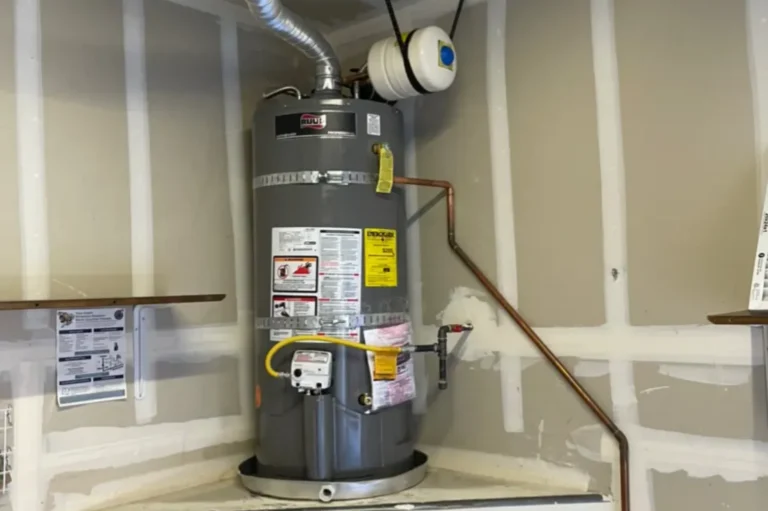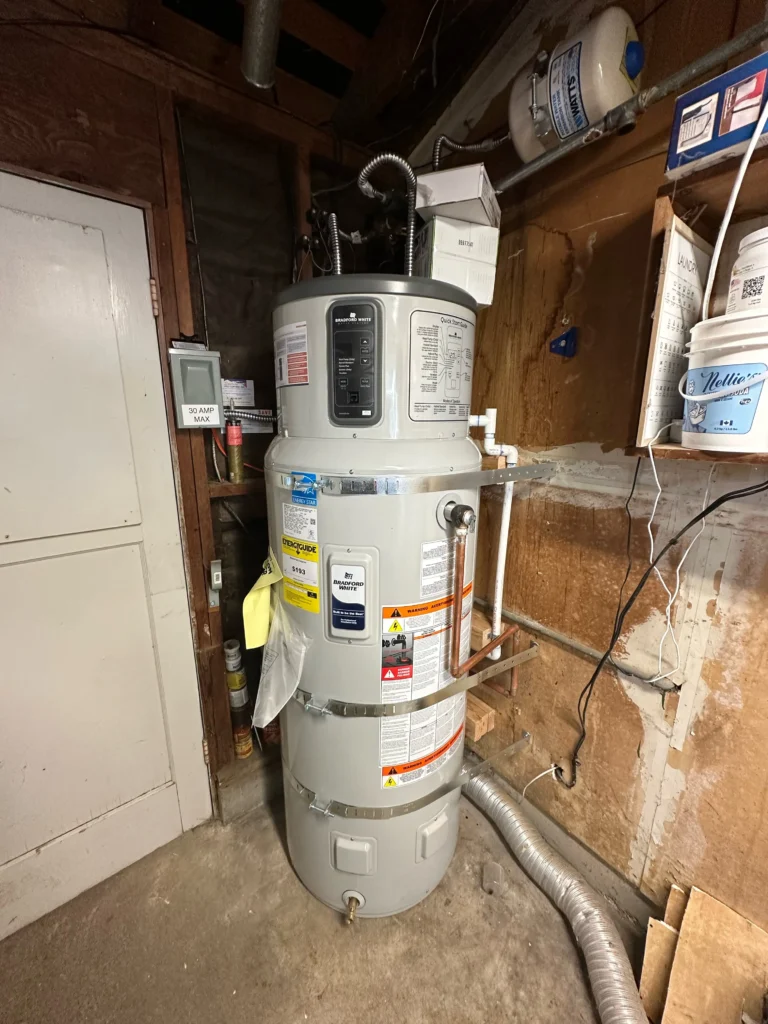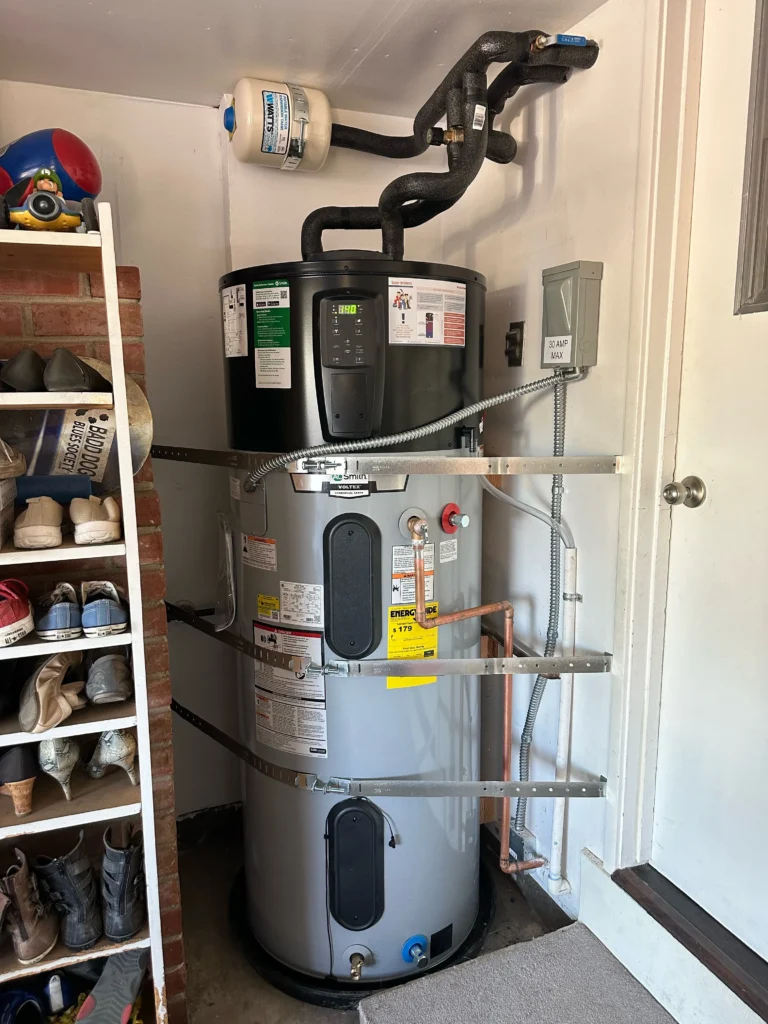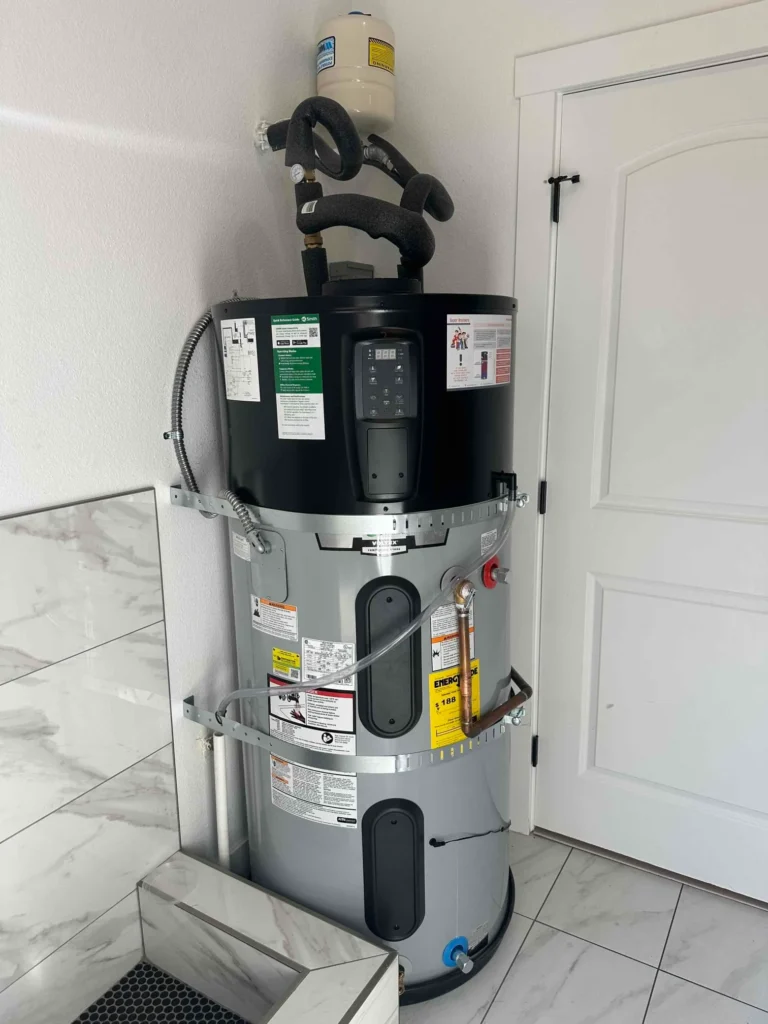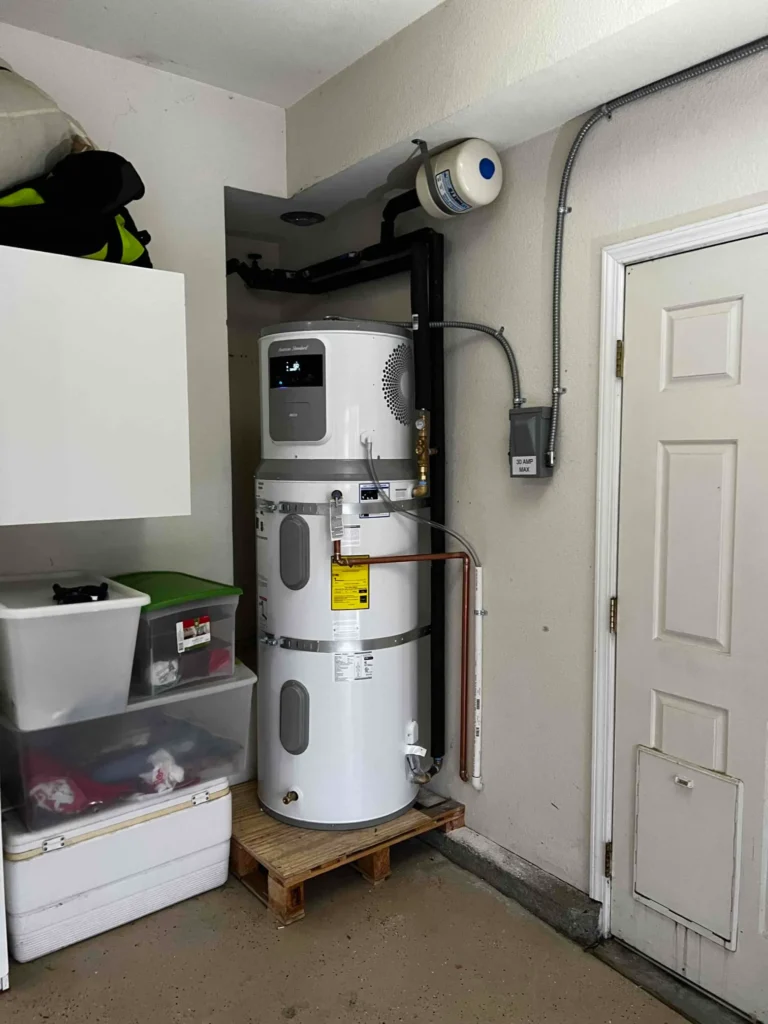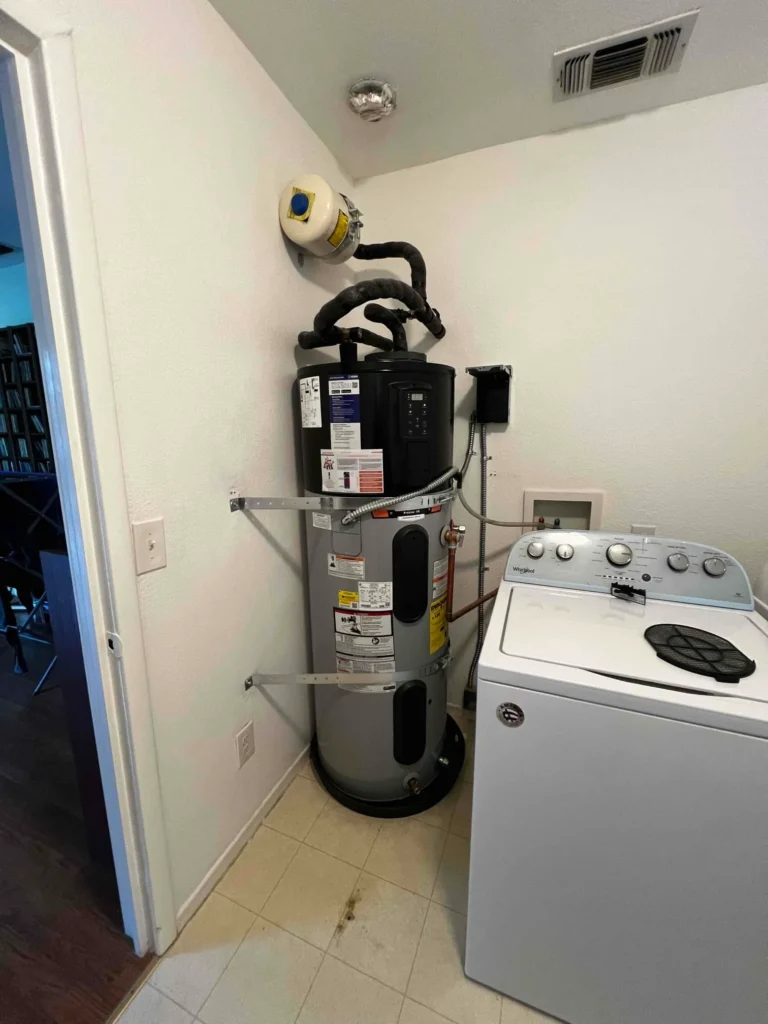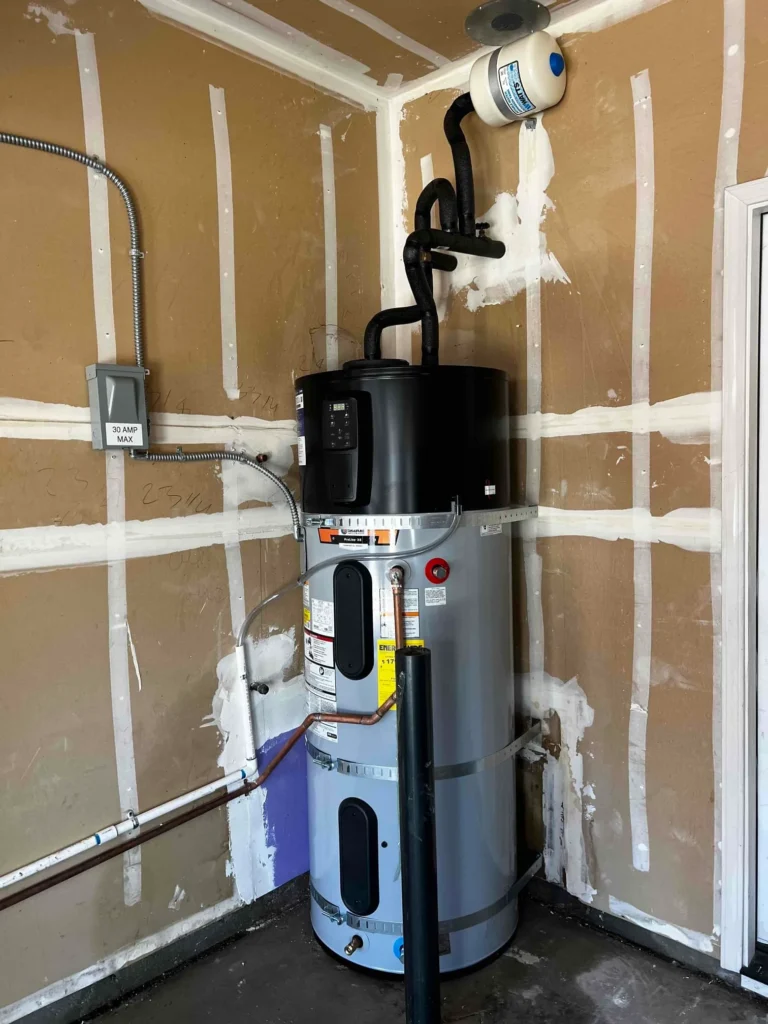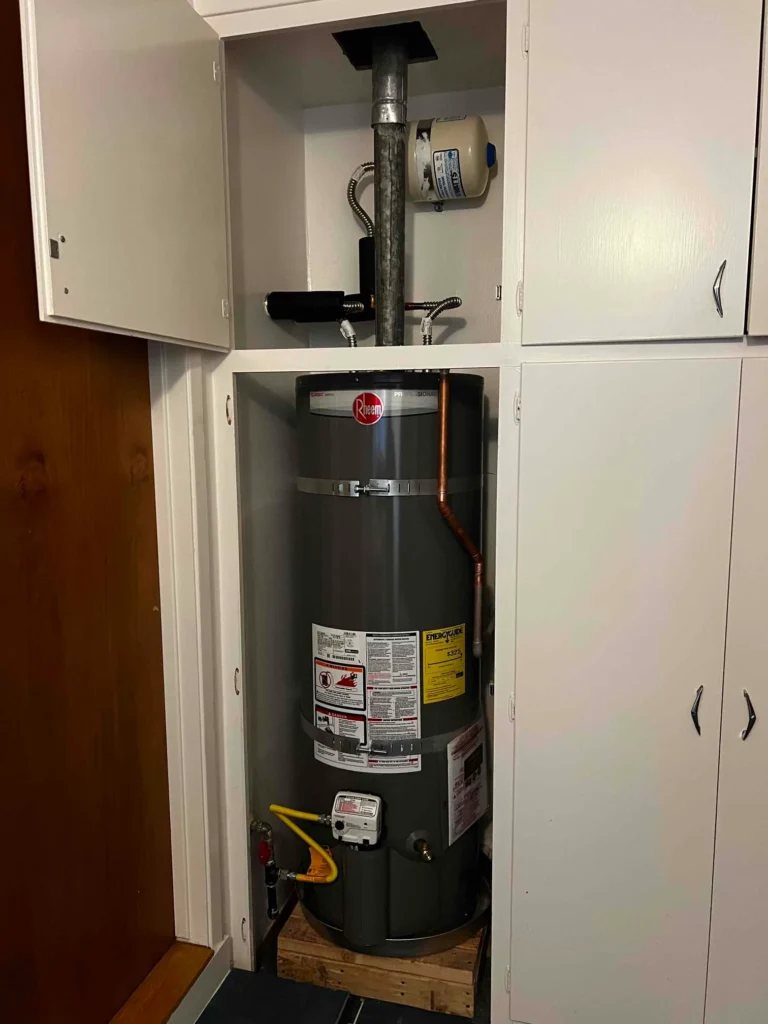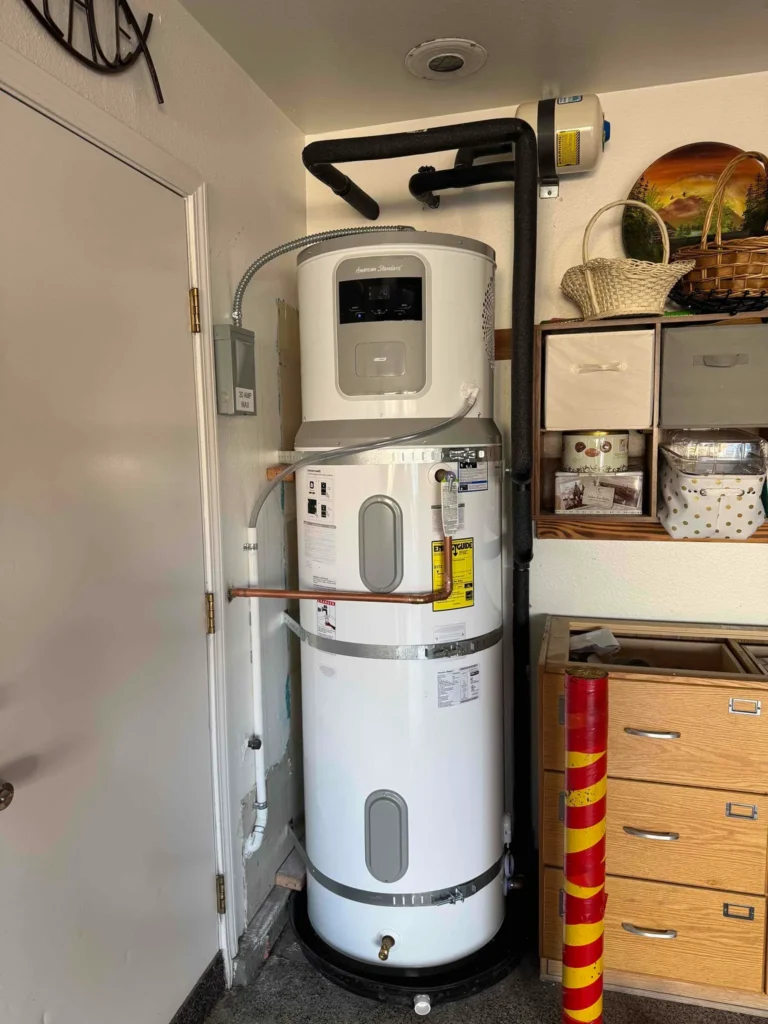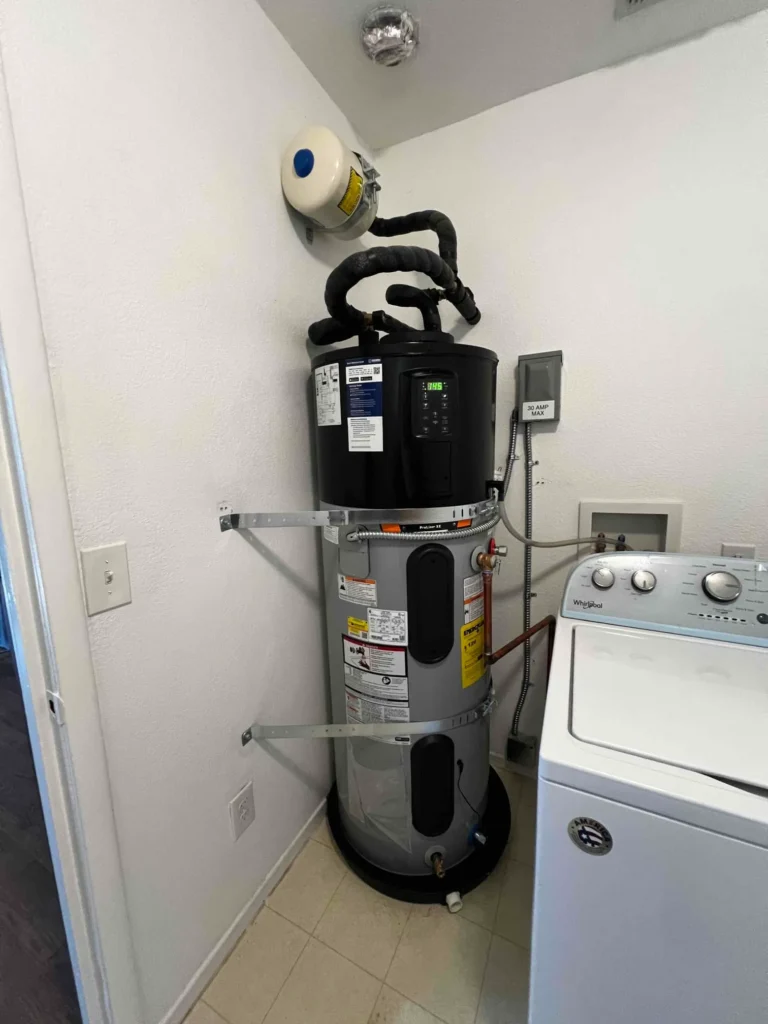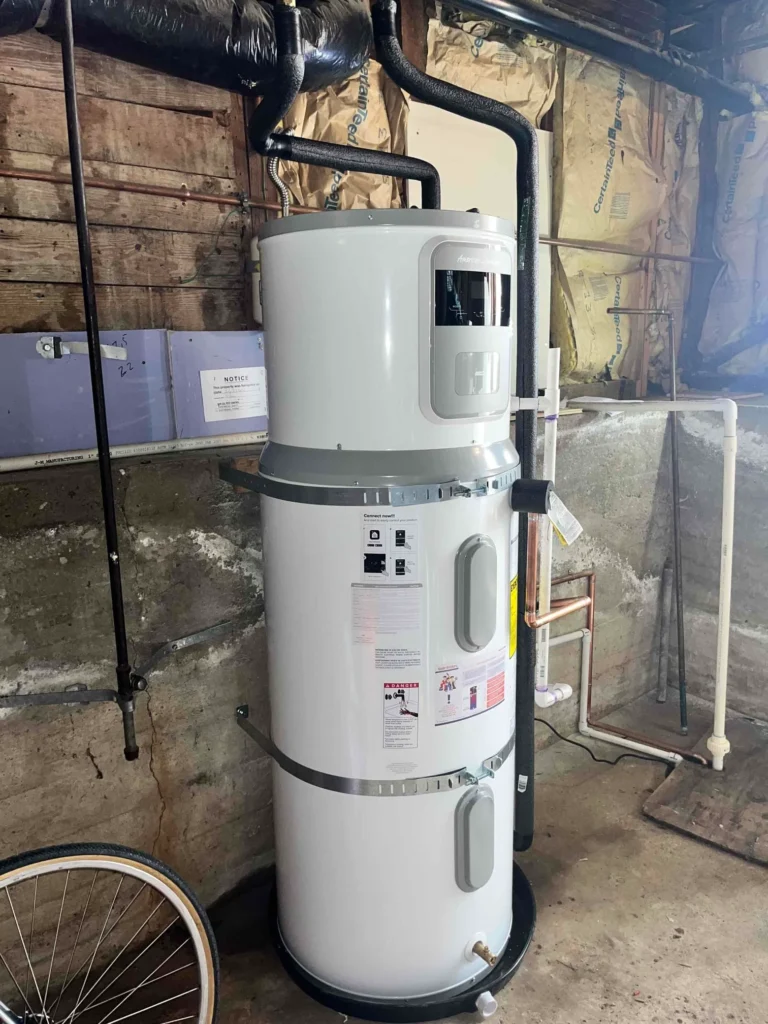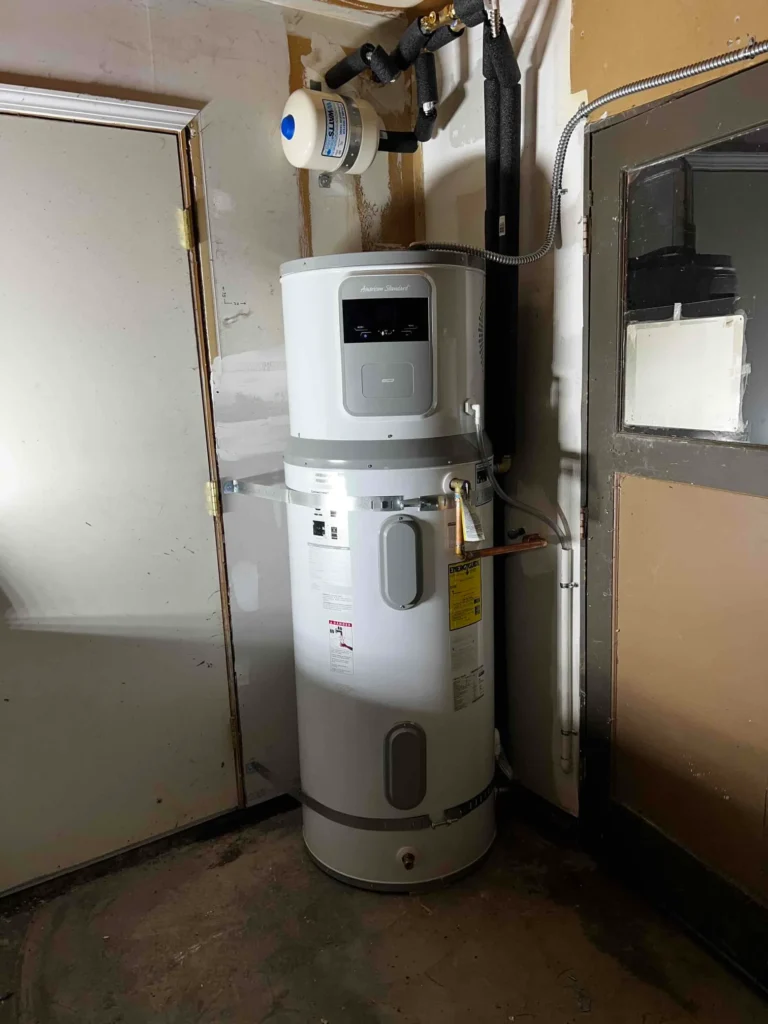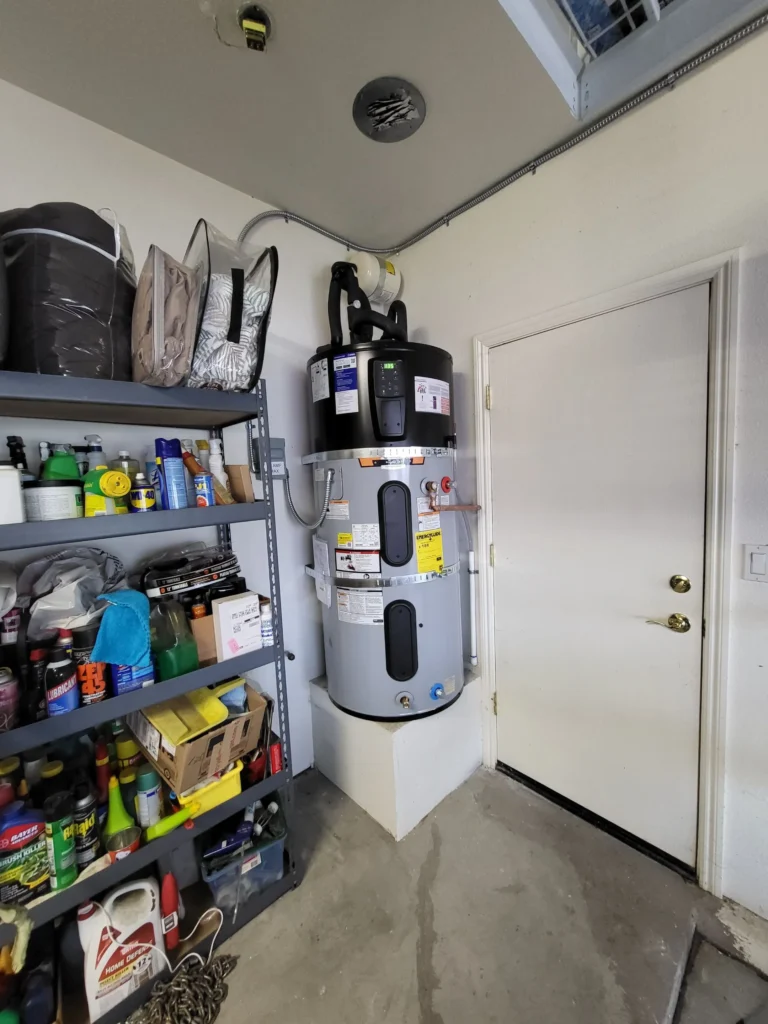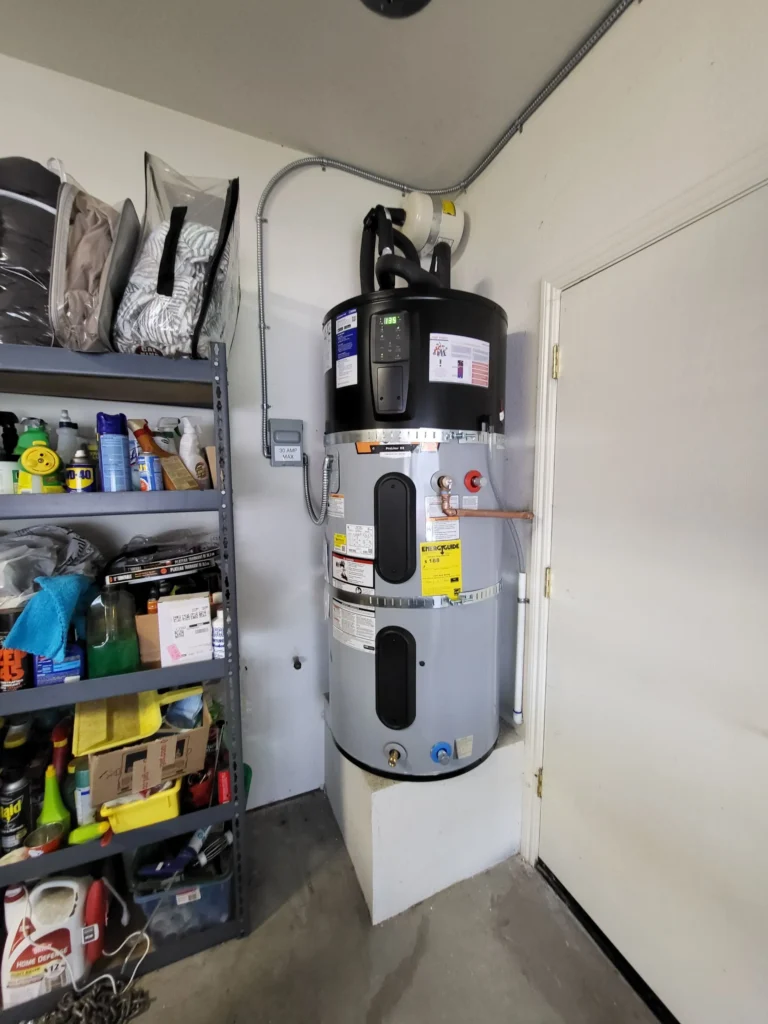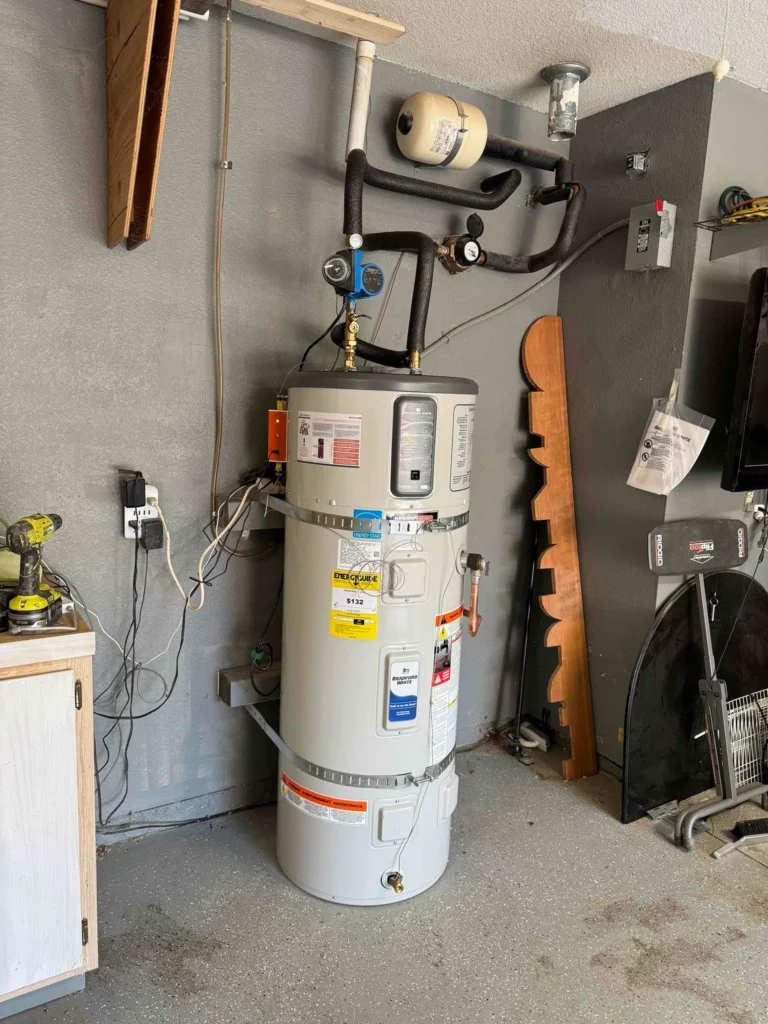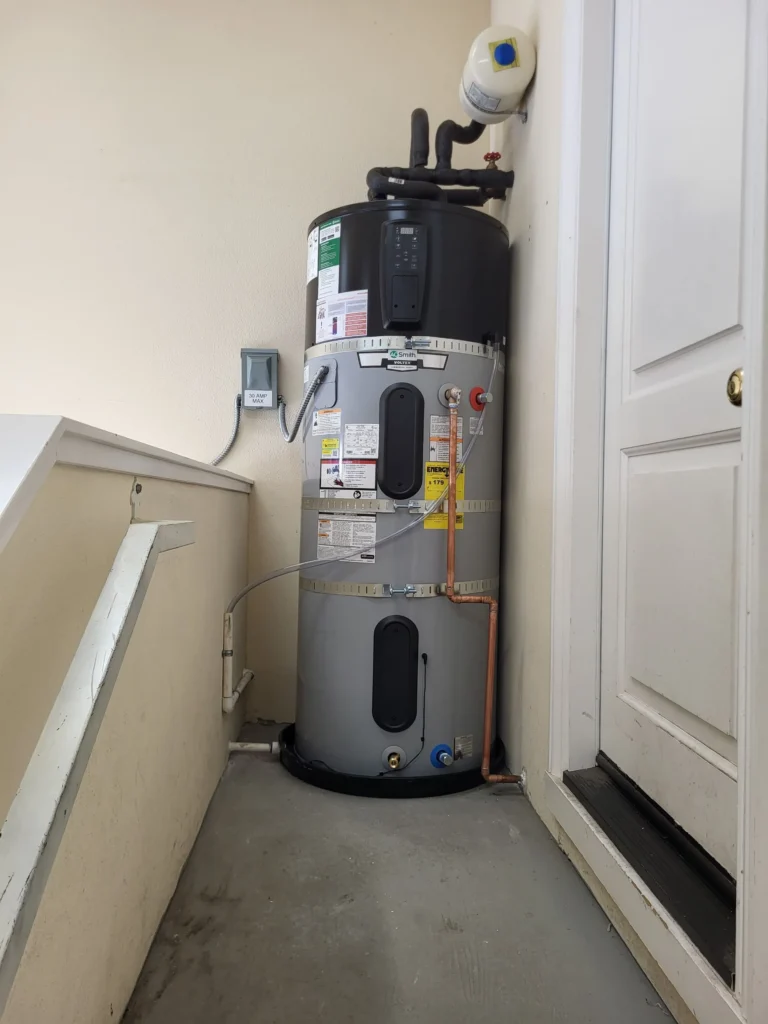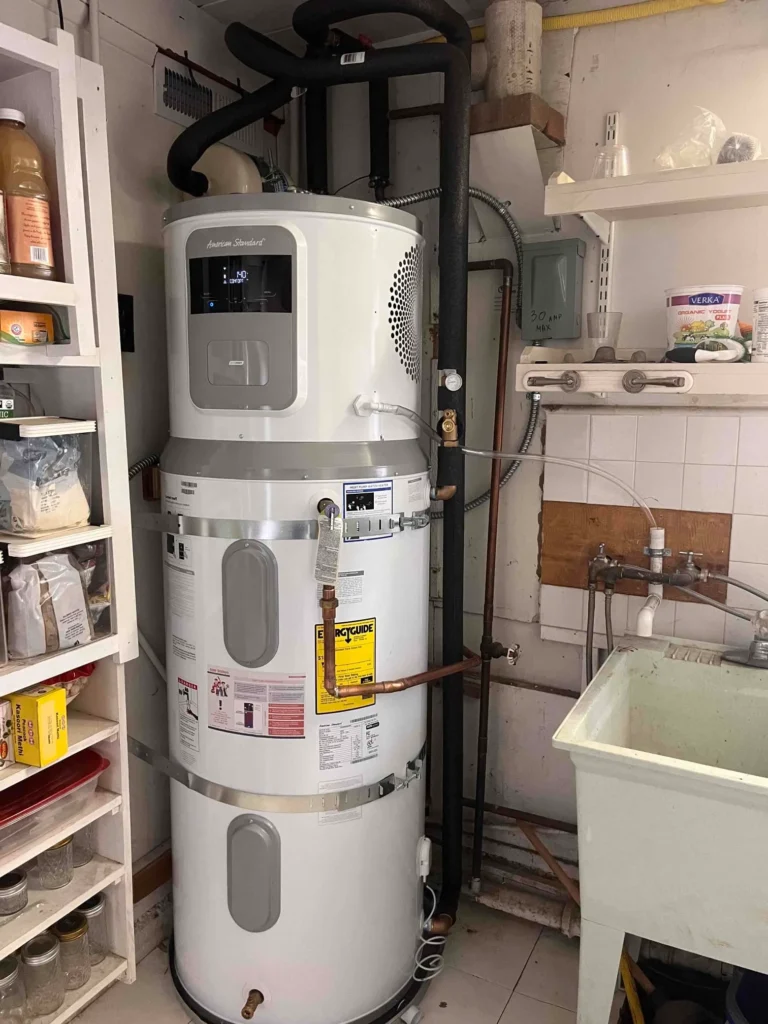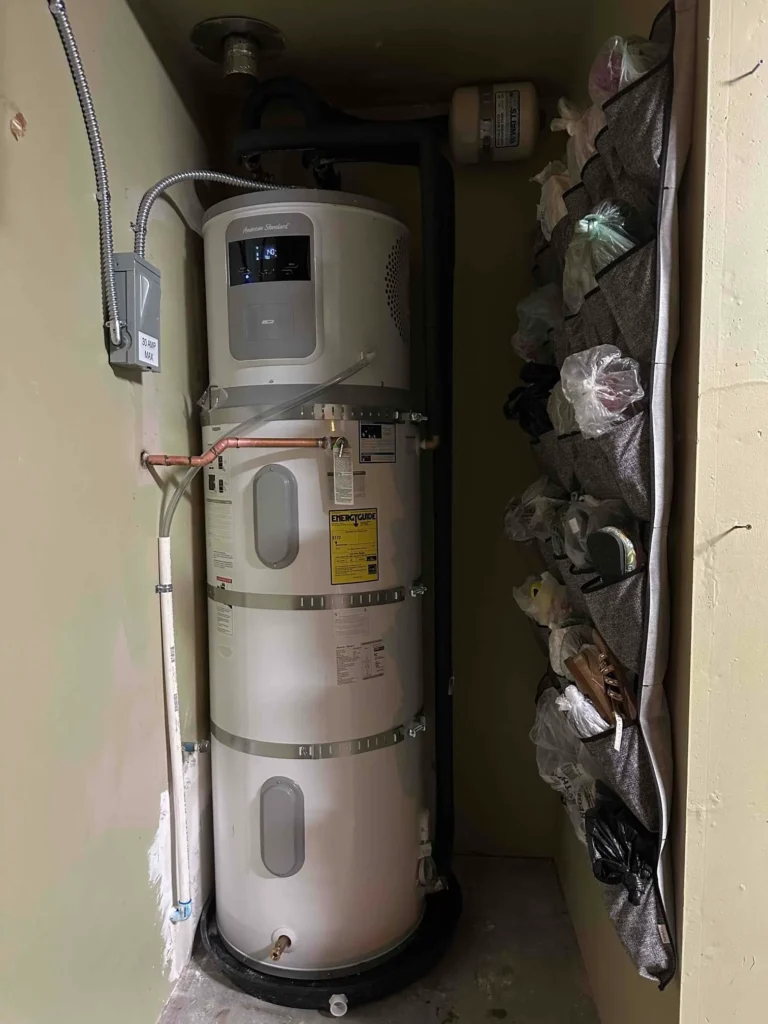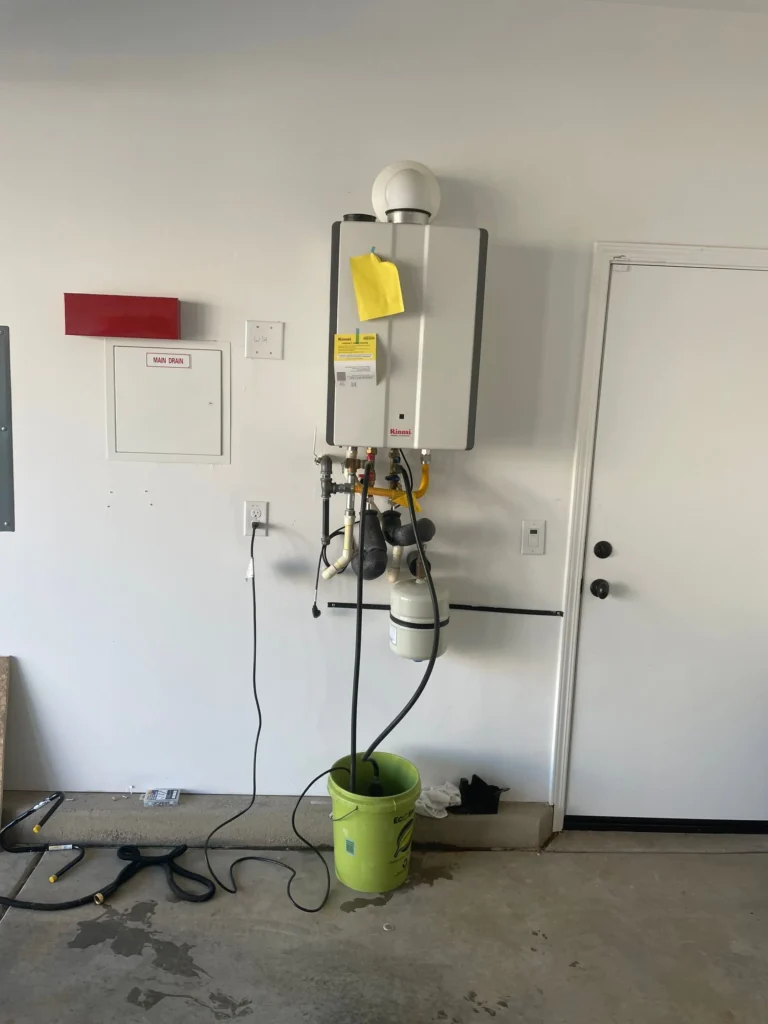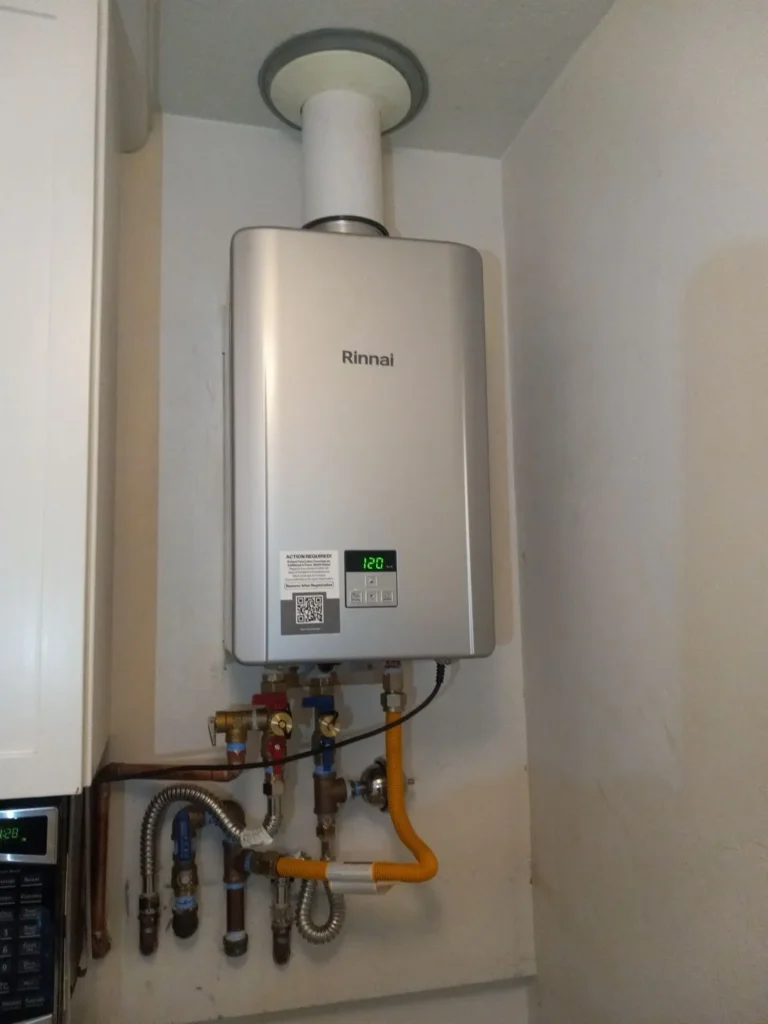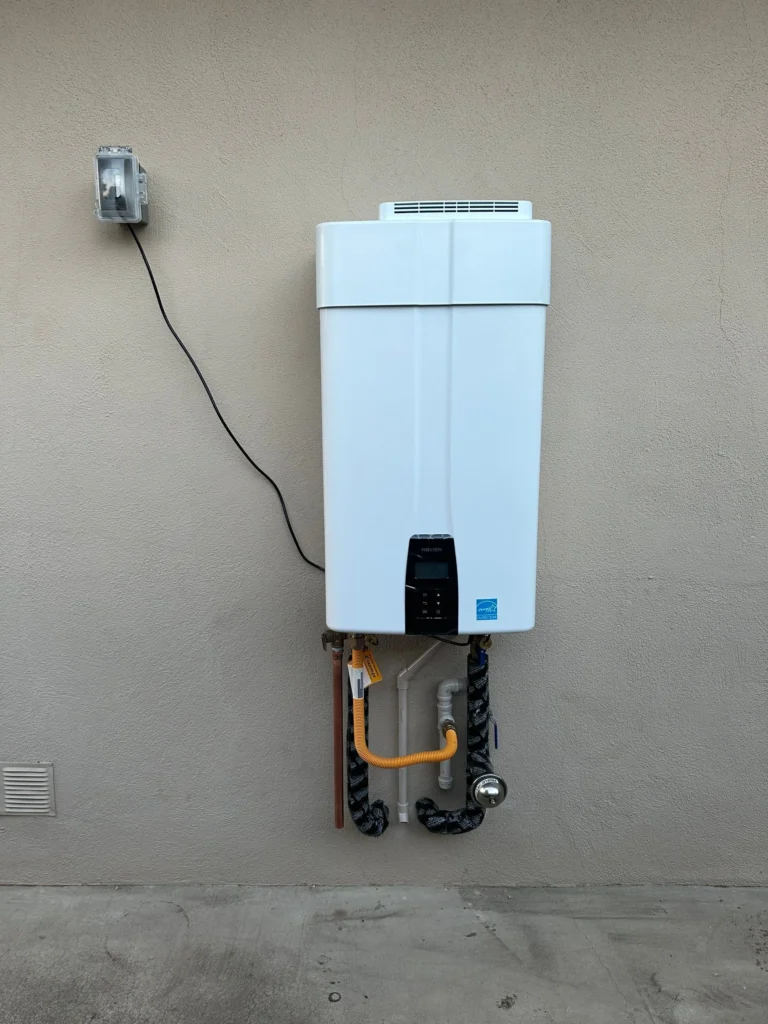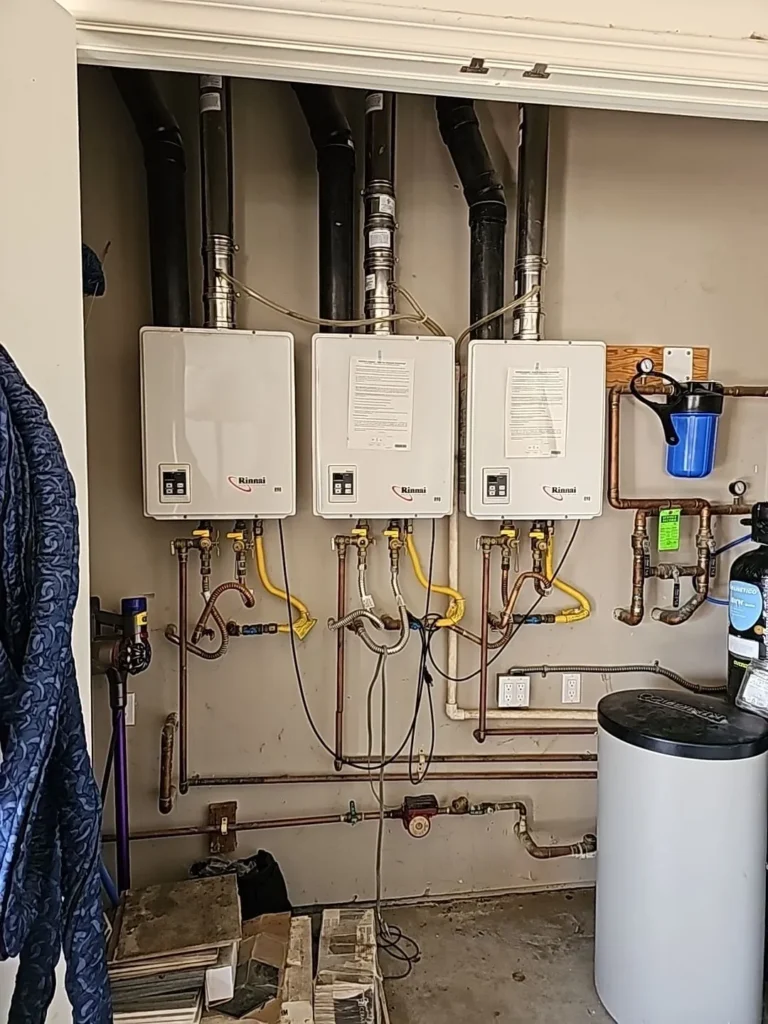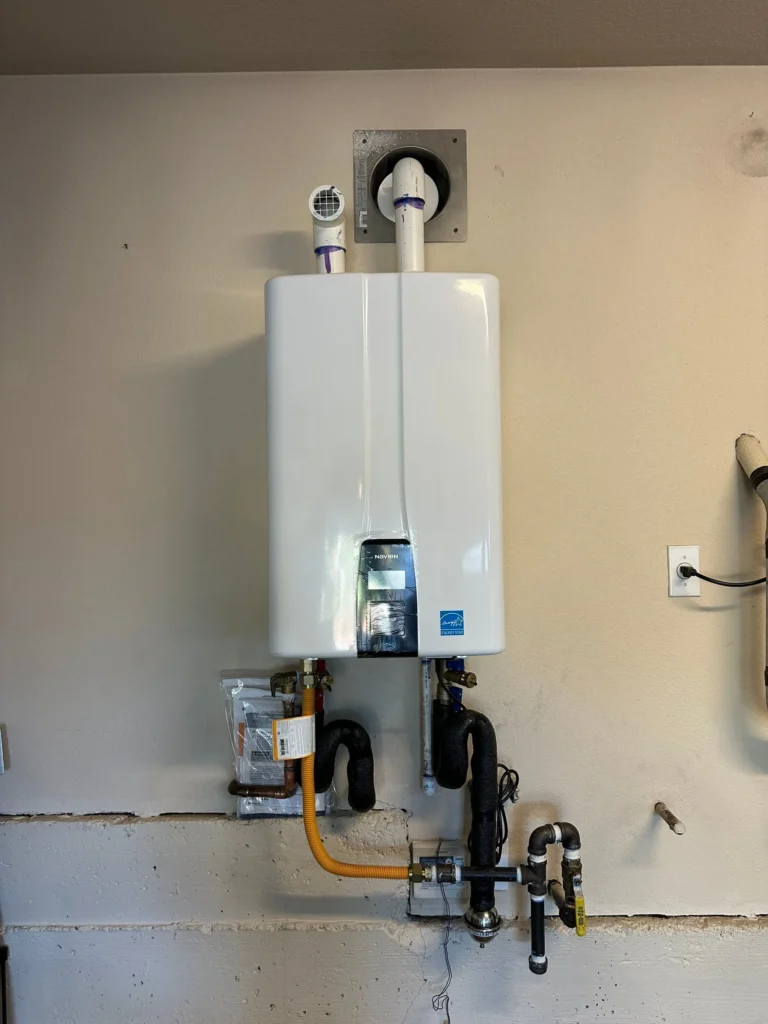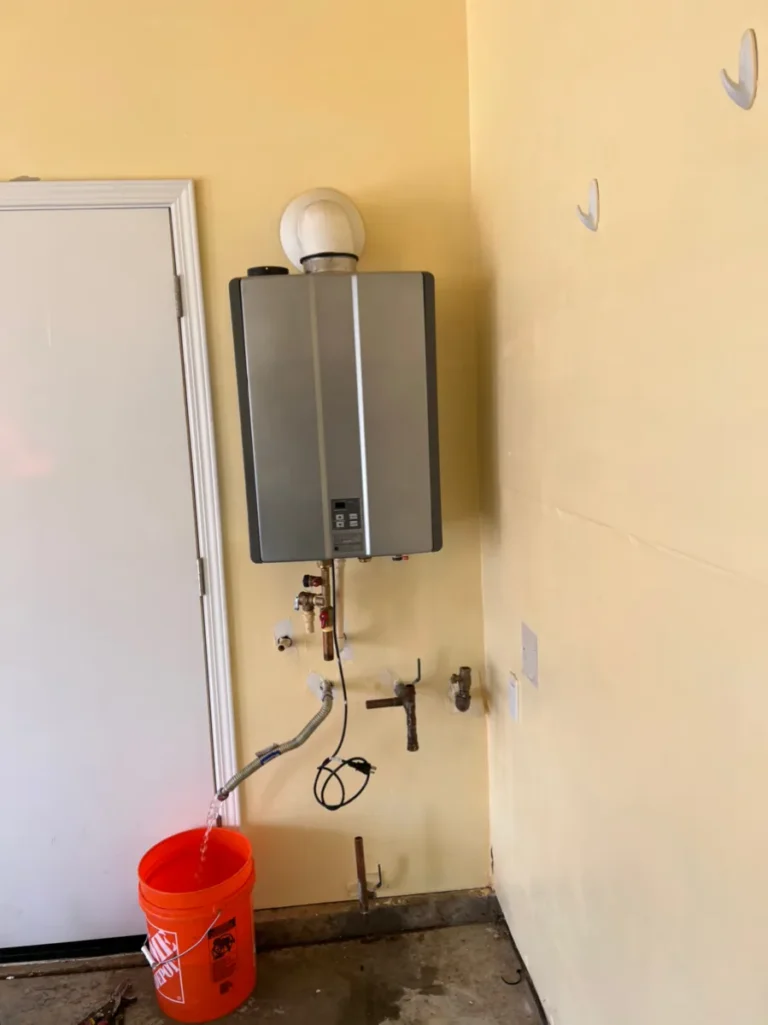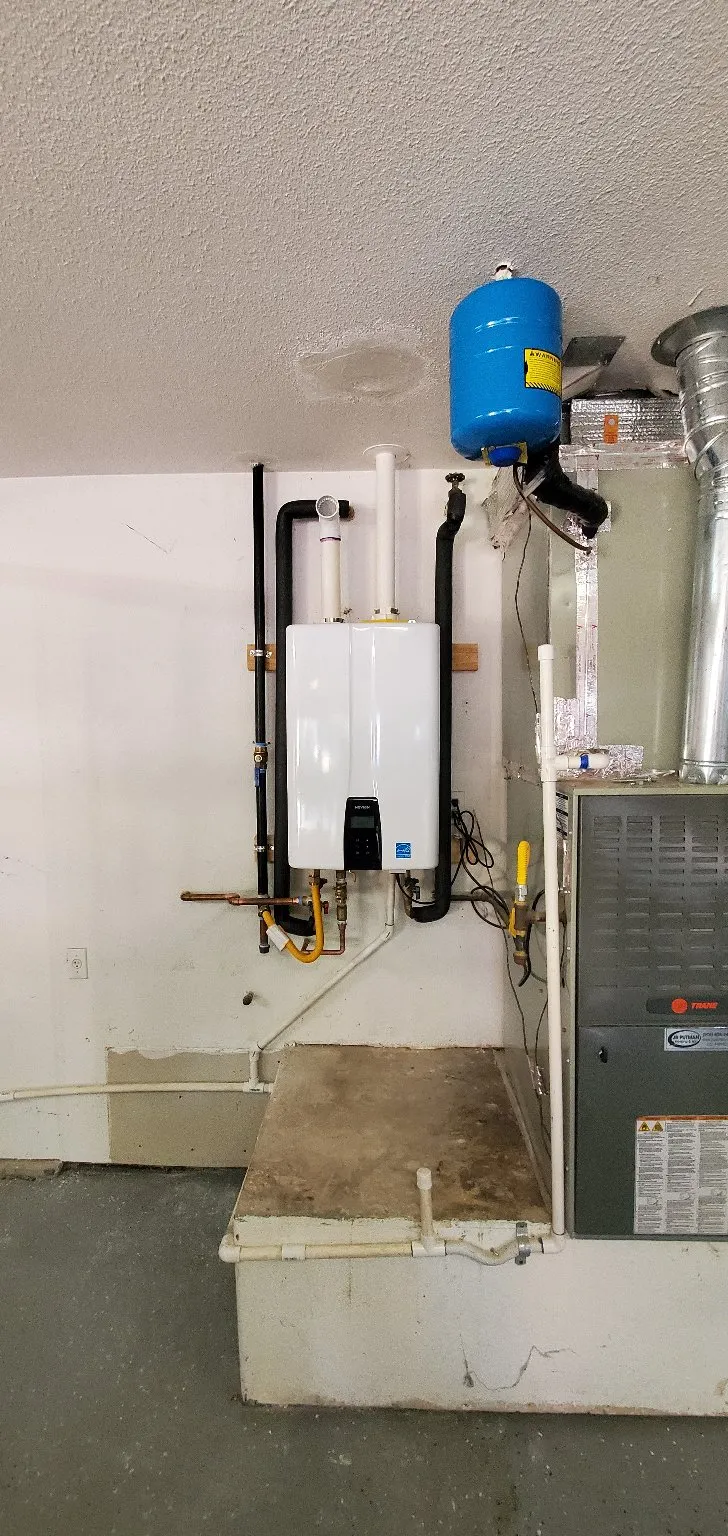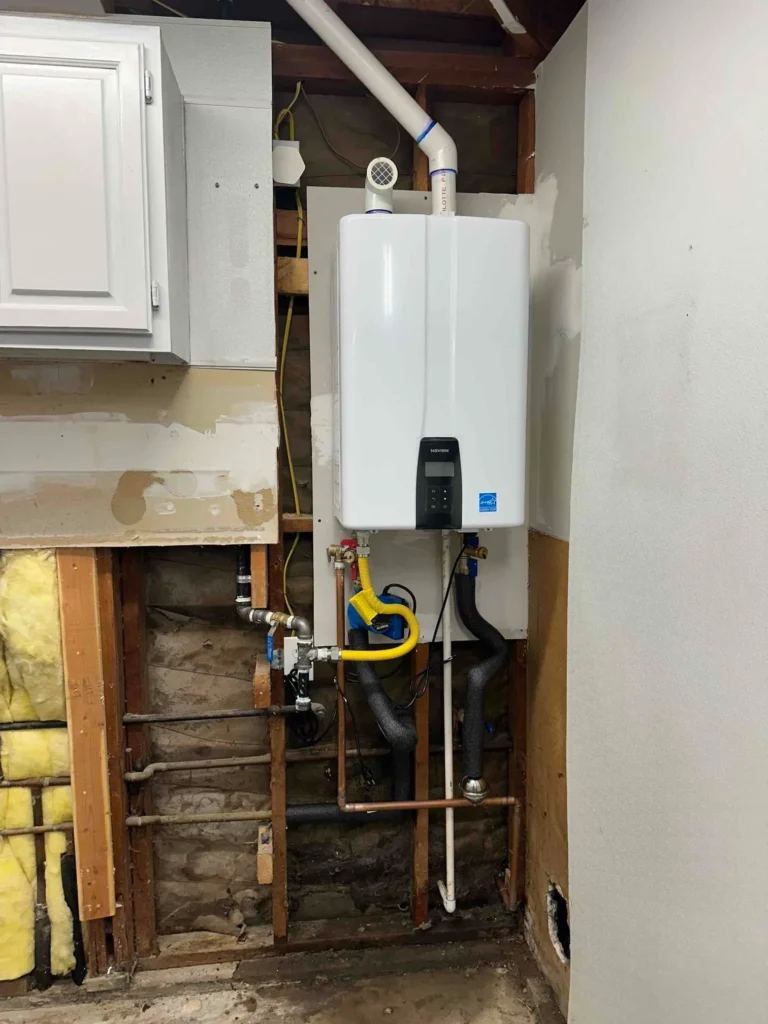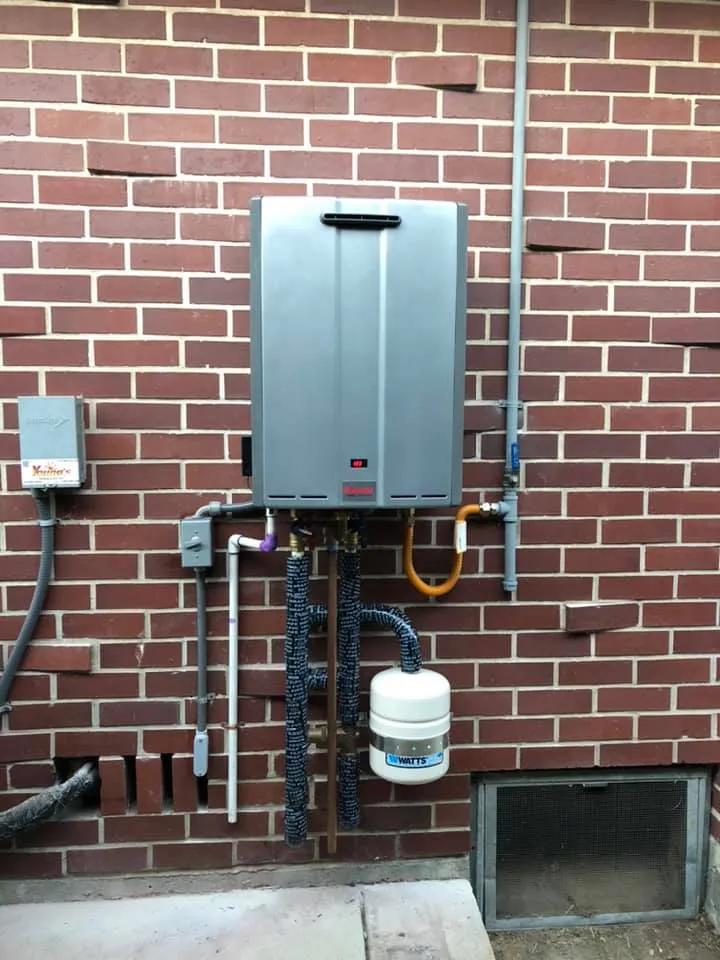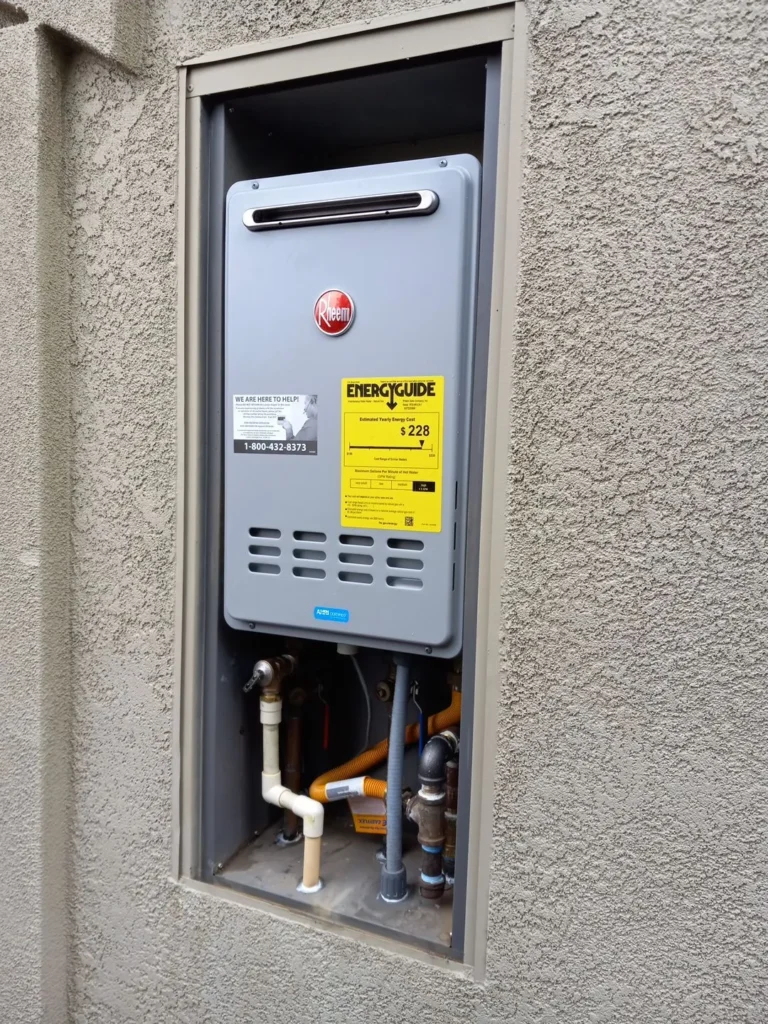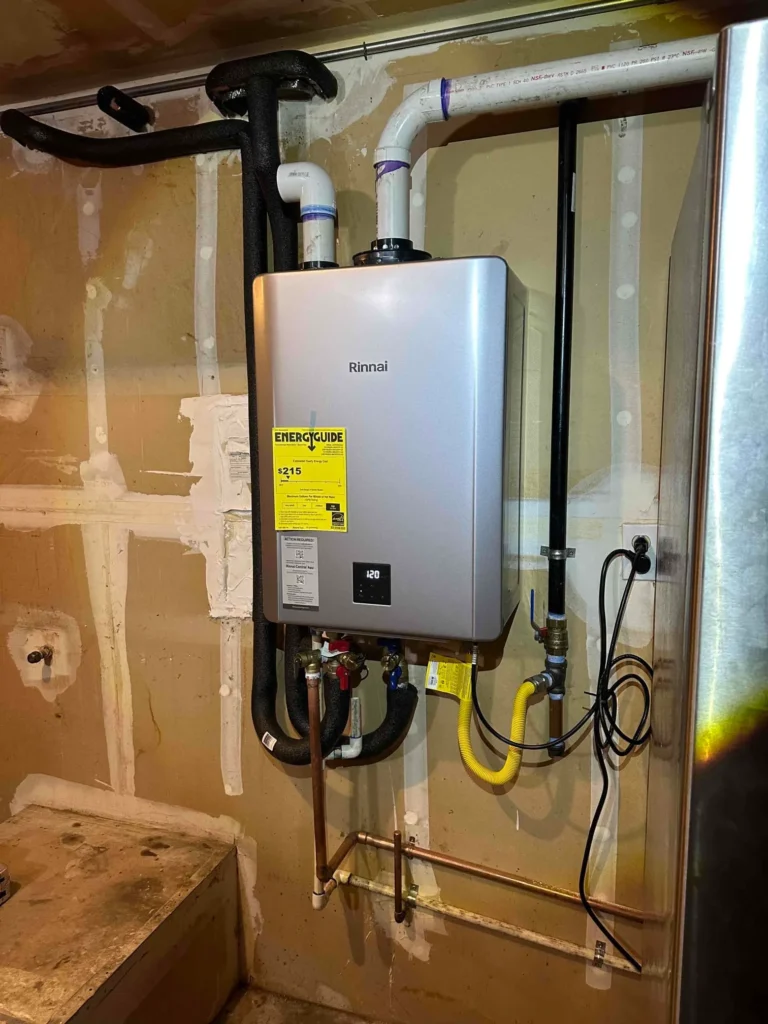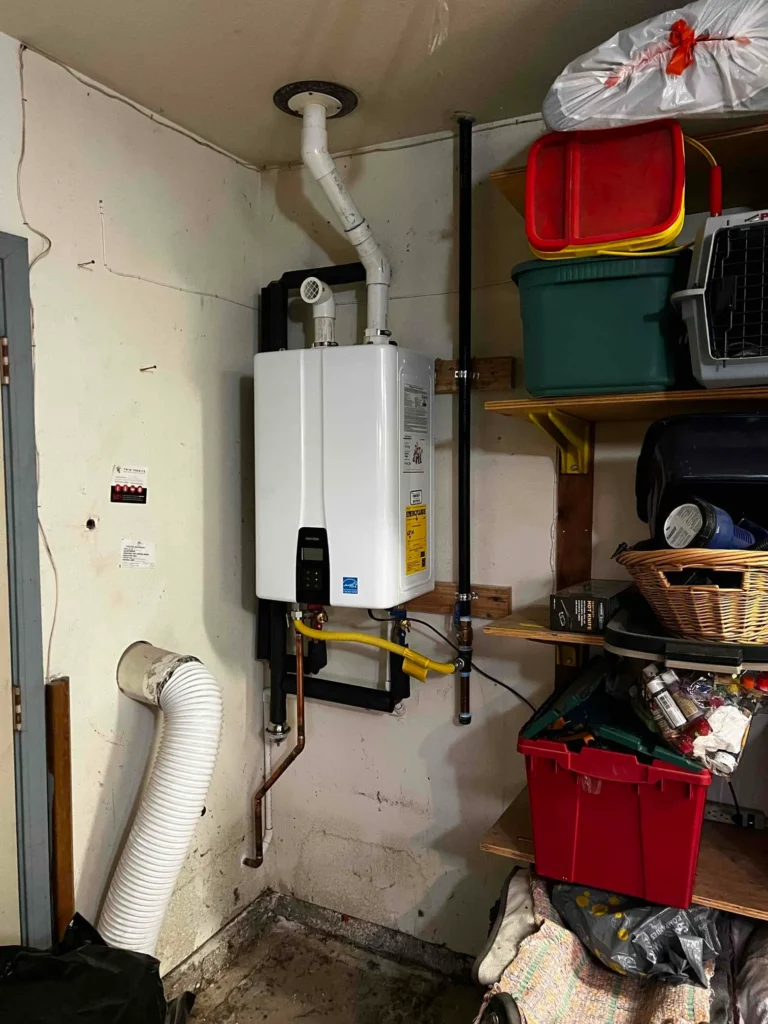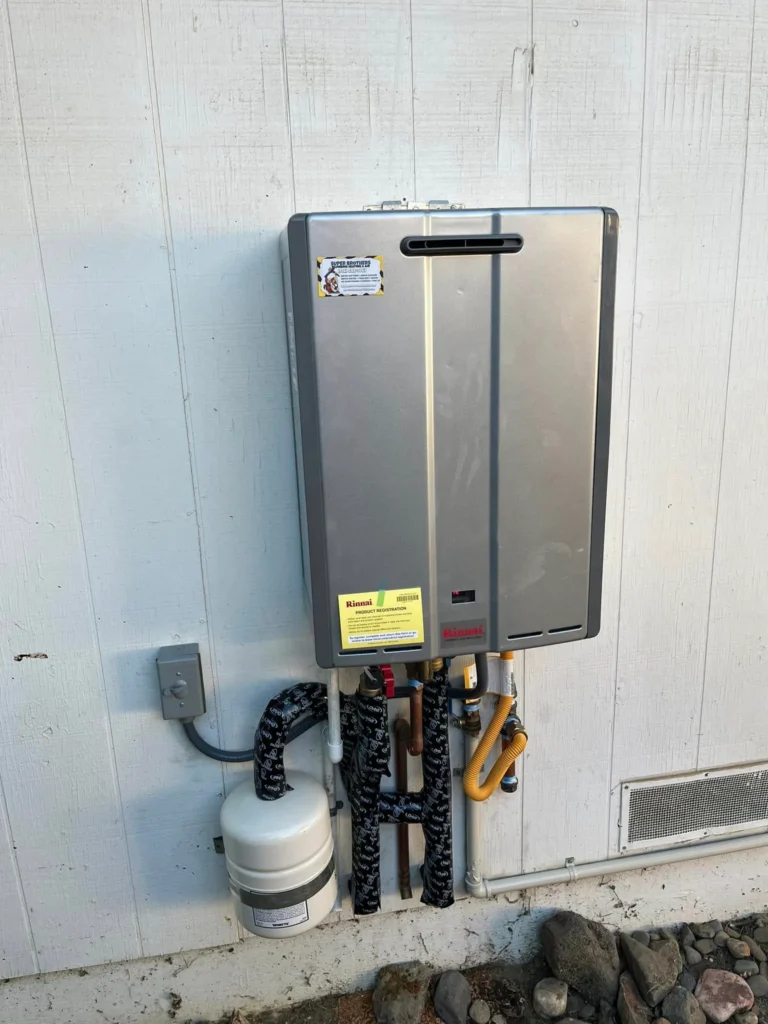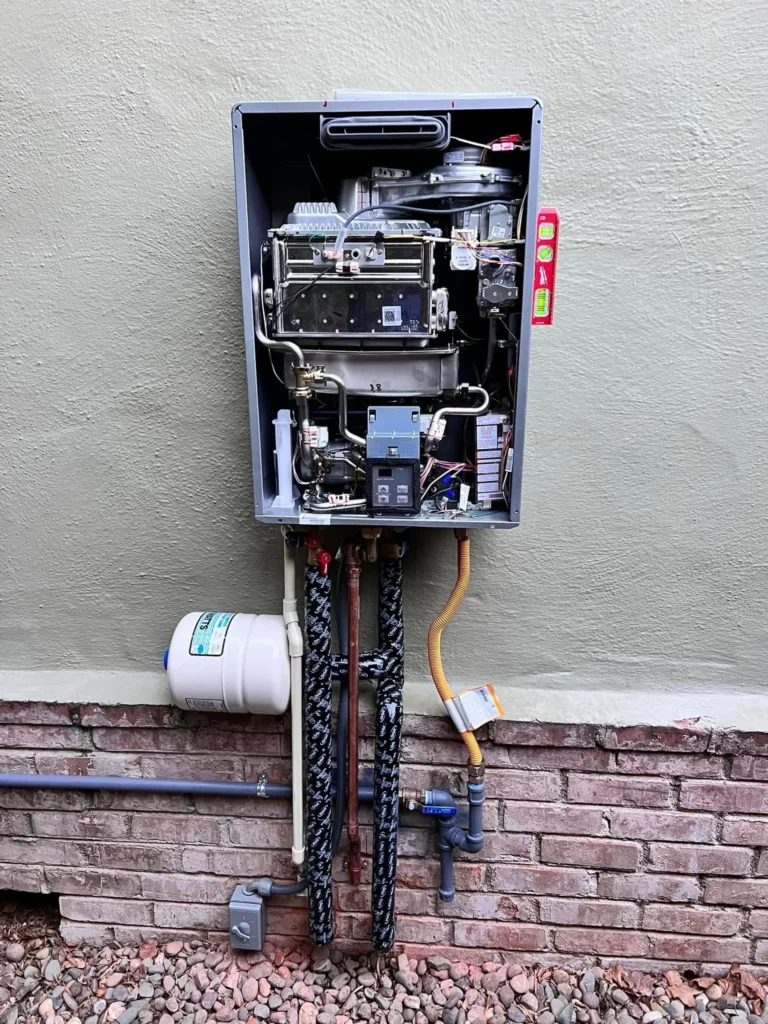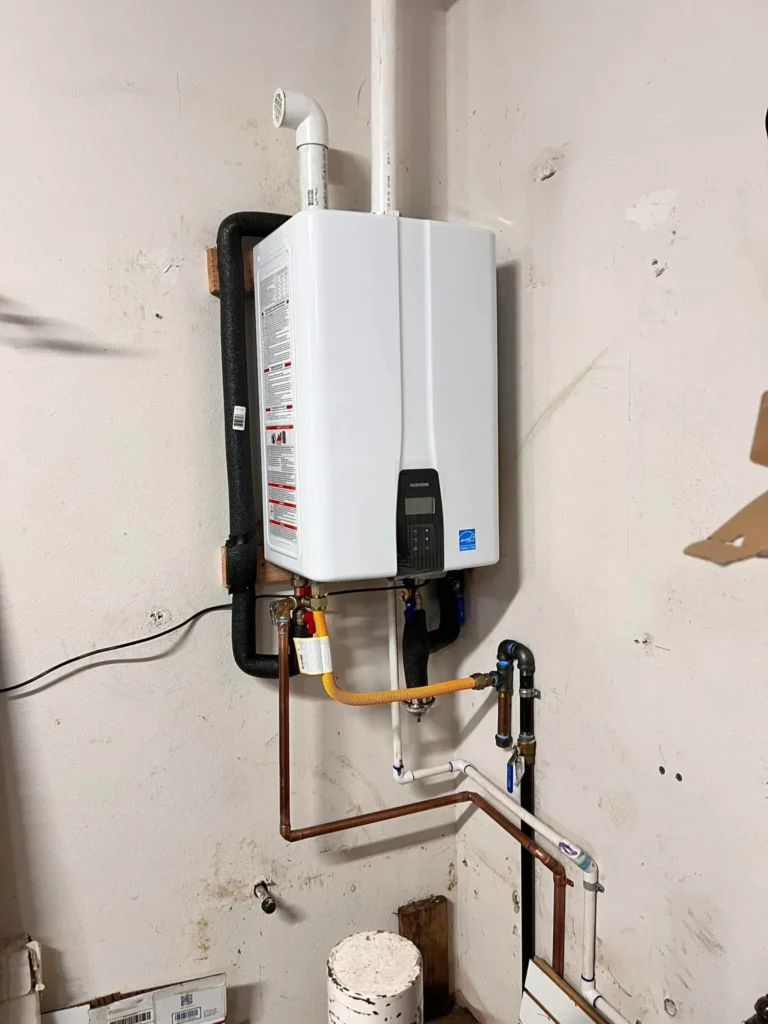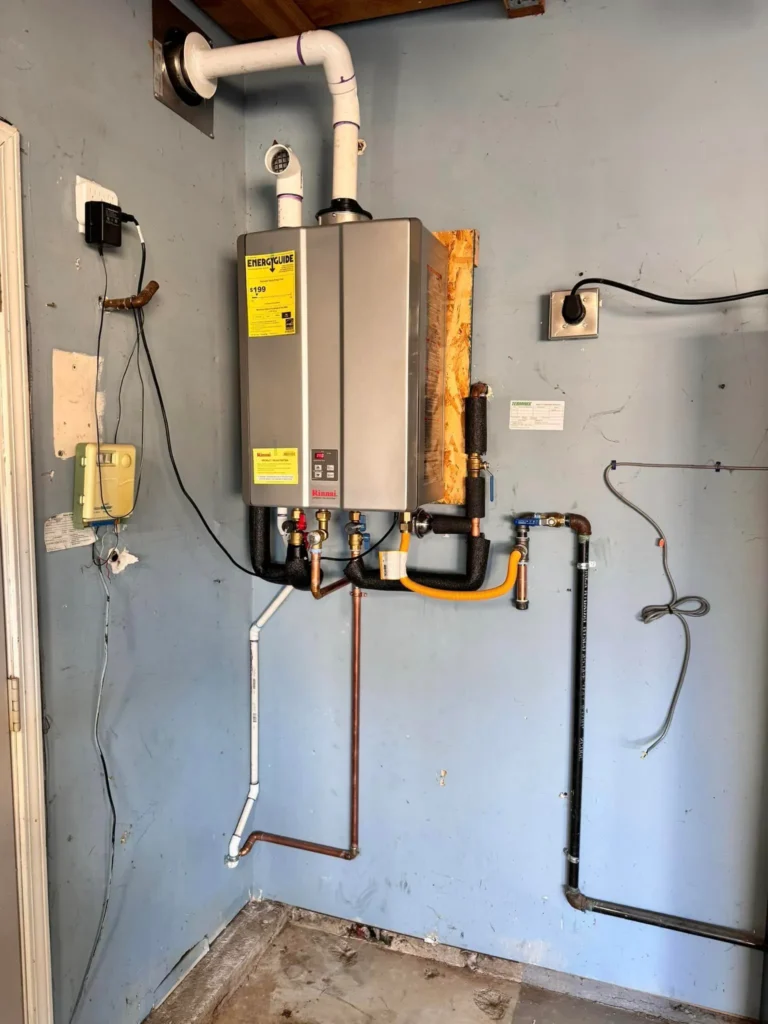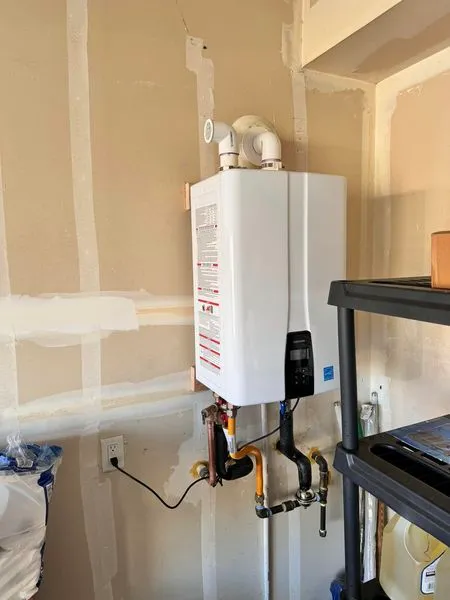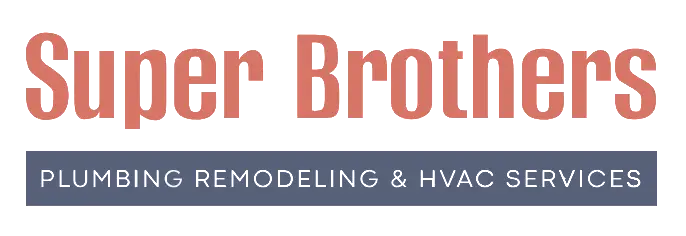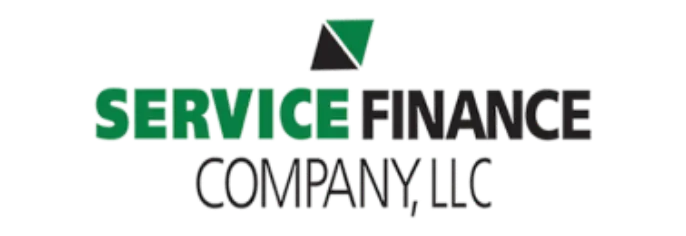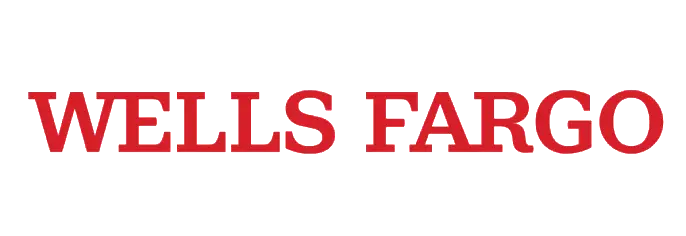We had our gas water heater go out on the weekend, and needed a replacement. I reached out to Super Brother's for a quote (based on some positive…
Hot water isn’t just a convenience — it’s something you rely on every day for cooking, cleaning, and comfort. When your old water heater starts showing its age, you need a replacement done quickly and done right. At Super Brothers Plumbing, Heating & Air, we specialize in hassle-free water heater replacements for homeowners in your area. From removing your outdated unit to installing a reliable, energy-efficient model, we handle every step with care and attention to detail. Our goal is to give you dependable hot water, lower utility costs, and the peace of mind that comes with professional installation.
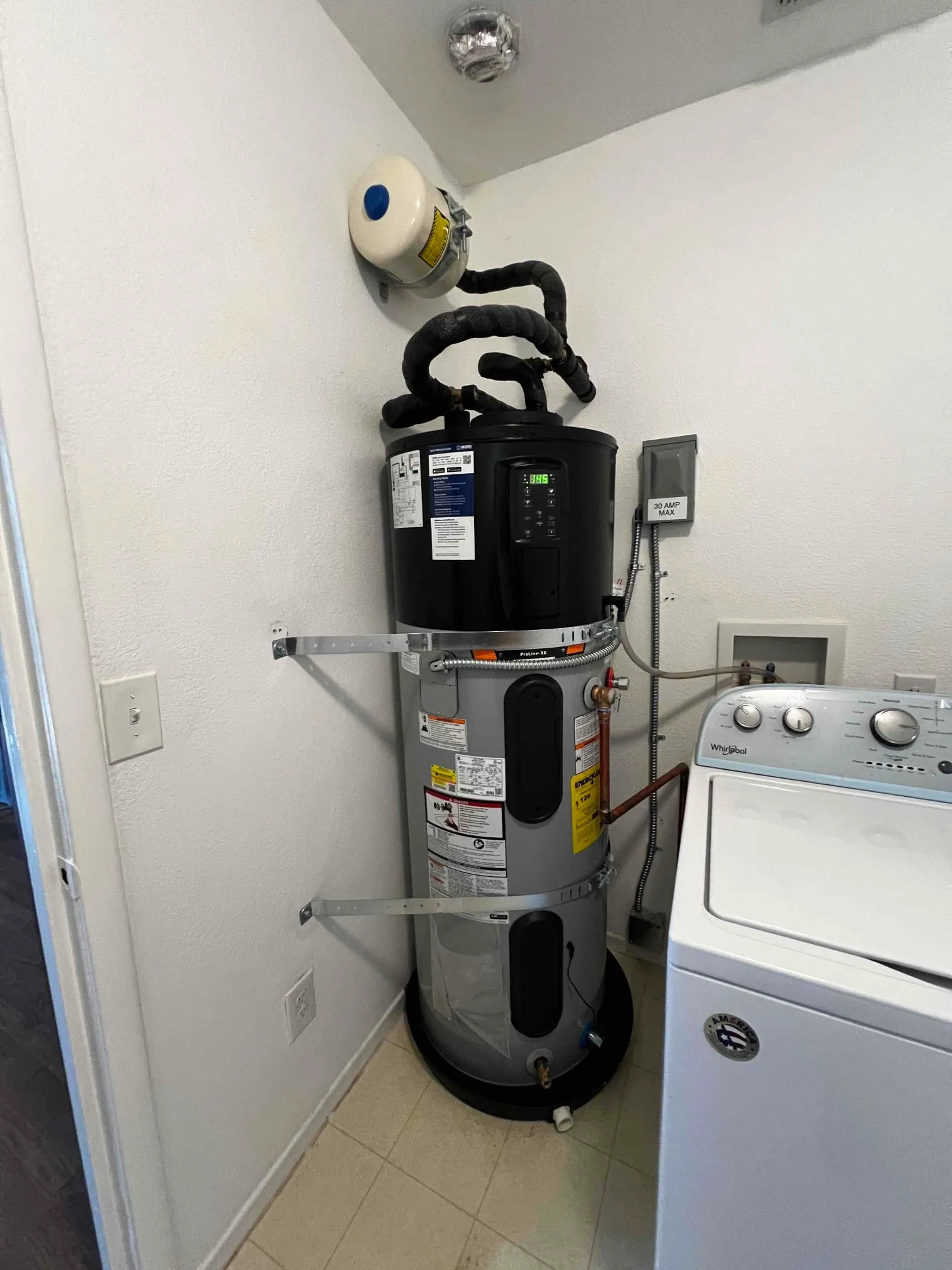
Heat Pump Water Heater
Heat pump water heaters are a cost-effective and energy-efficient solution, combining the benefits of traditional and electric water heaters. Whether you’re looking to install a new hybrid water heater or replace an outdated unit, our experienced technicians provide reliable service tailored to your needs.
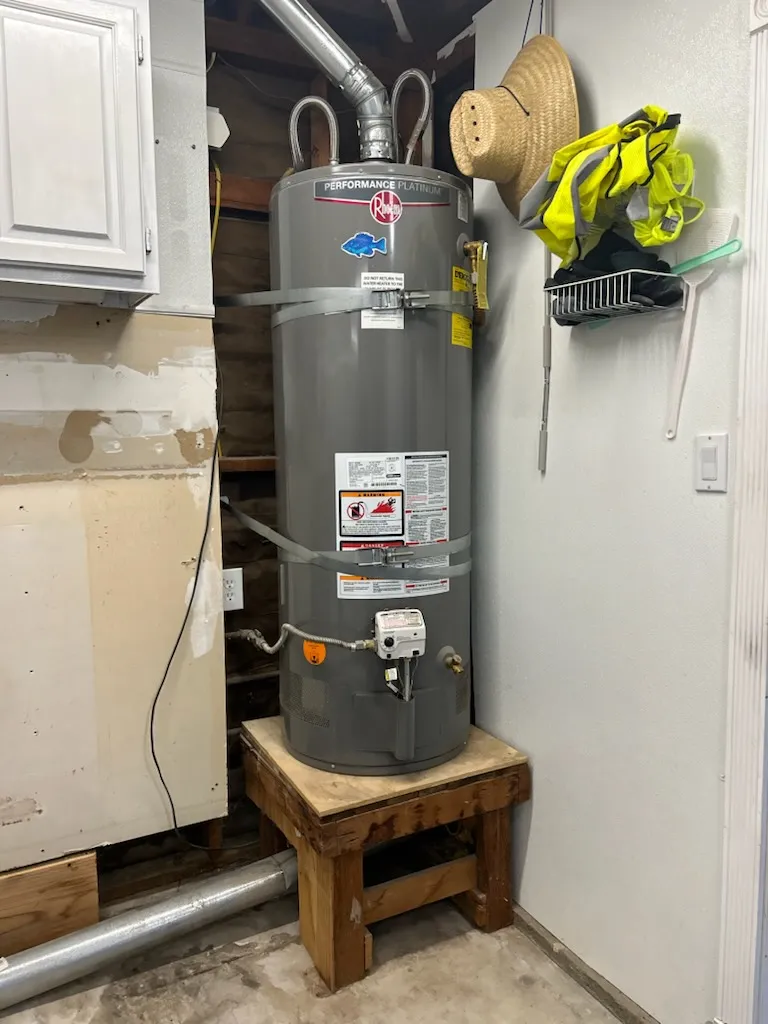
Electric Water Heater
Electric water heaters are a reliable and efficient choice for providing hot water. Electric heaters work by using heating elements that are immersed in the water tank to heat the water. Once the water reaches the desired temperature, it is stored in an insulated tank until it is needed.
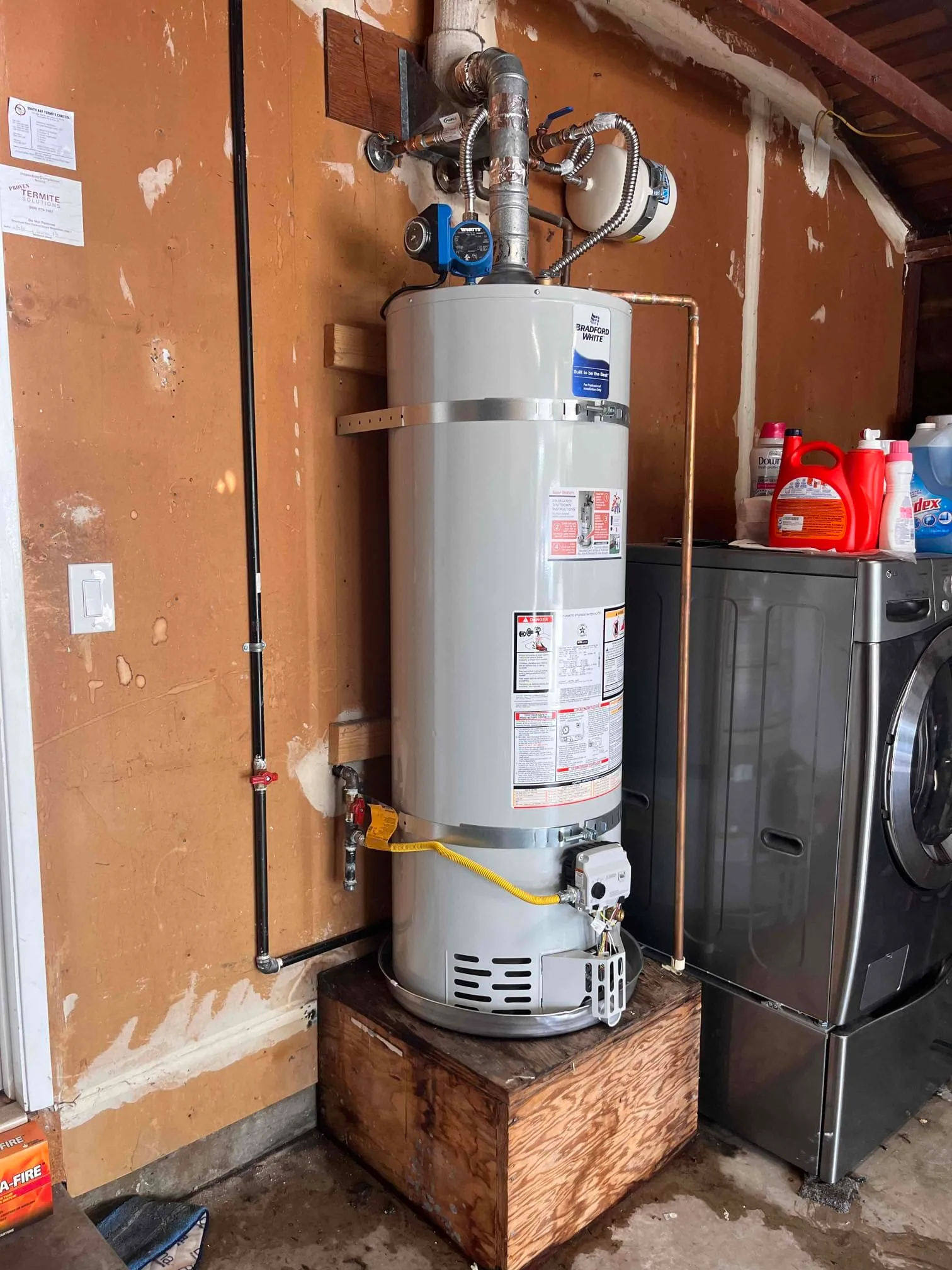
Gas Water Heater
Gas water heaters remain a popular choice for Local homeowners who want reliable hot water and fast recovery times. Powered by natural gas or propane, these units heat water quickly and are often more cost-effective to run compared to electric models. A gas water heater can provide years of dependable performance, making it a smart option for families that use a lot of hot water each day.
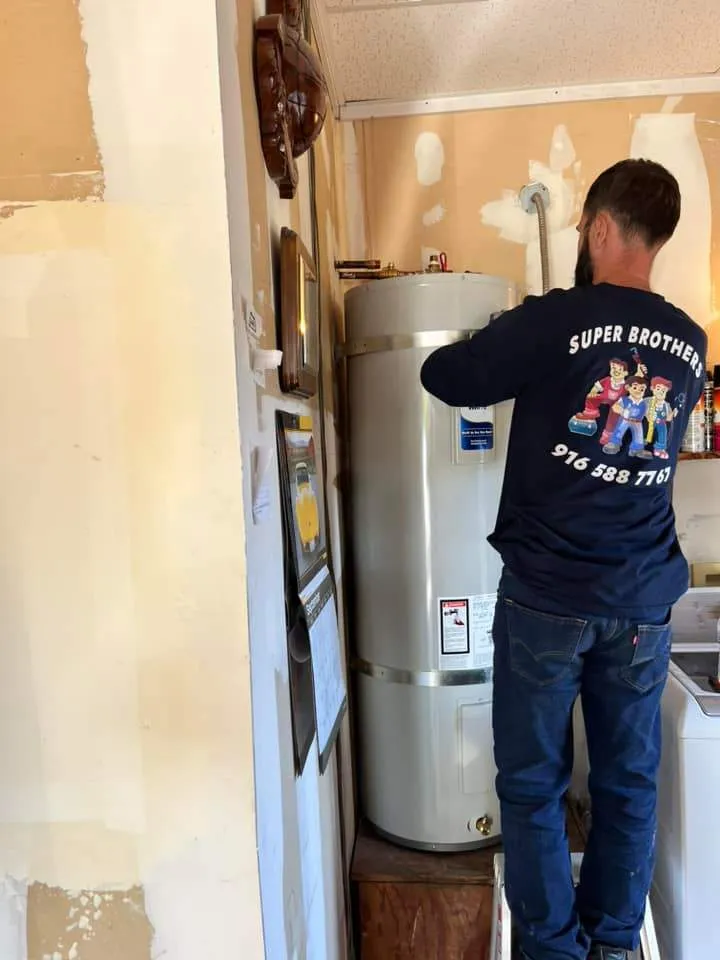
Water Heater Maintenance and Repair
We keep your hot water dependable year-round with fast repairs and routine tune-ups. If you’re noticing lukewarm water, rumbling noises, rusty color, leaks, or a pilot that won’t stay lit, our techs can diagnose the issue and fix it the right way, without guesswork or upsells.
Local Heat Pump Heater Installation
- Eco-Friendly Choice – By reducing energy consumption, you shrink your household’s carbon footprint while still enjoying reliable hot water.
- Consistent Comfort – Heat pump technology delivers steady hot water without the high spikes in energy use.
- Long-Term Savings – With energy efficiency rebates and lower monthly bills, your investment can pay for itself over time.
- Durability – Many heat pump water heaters are designed to last longer than conventional tanks, meaning fewer replacements and repairs.
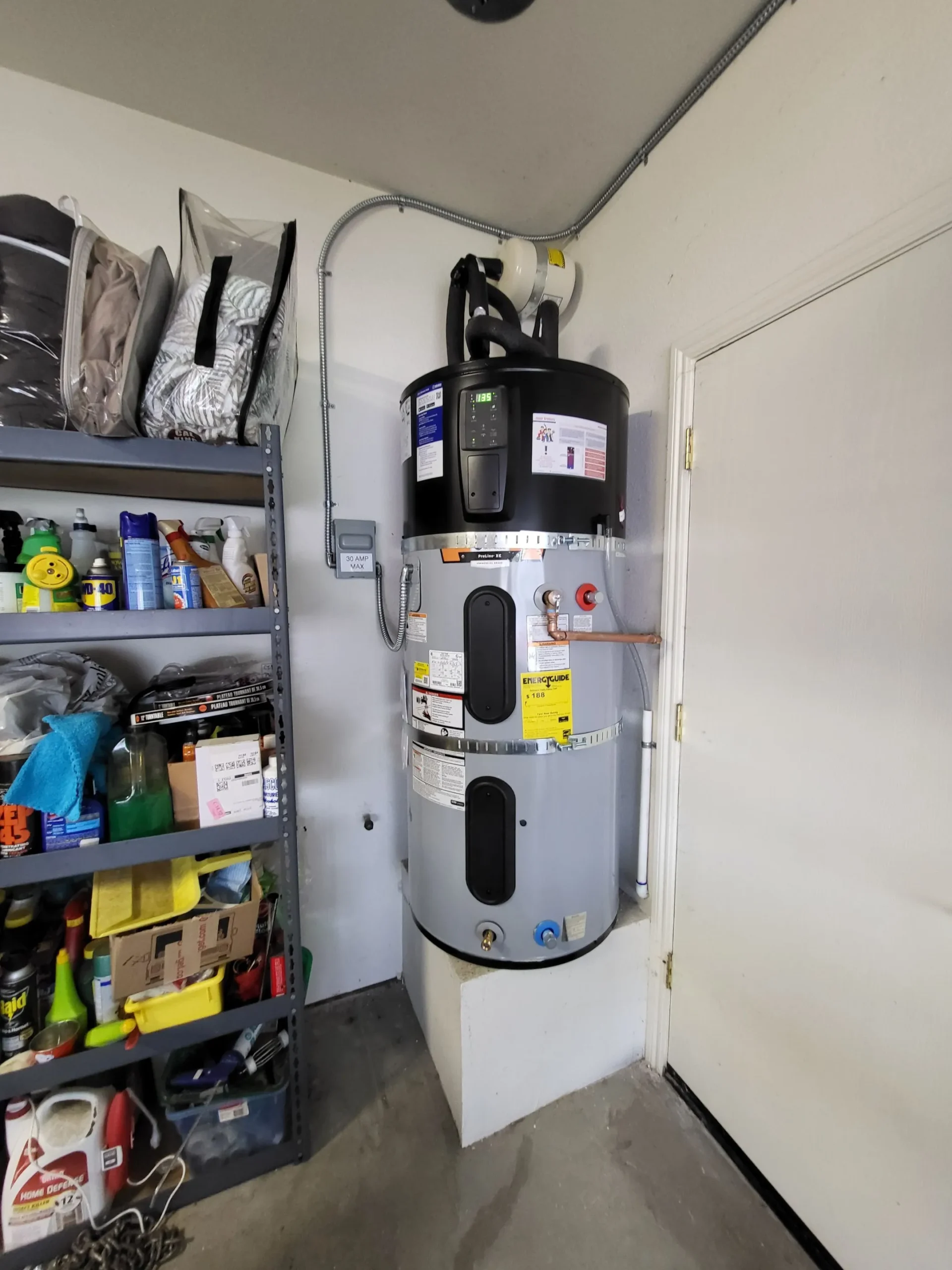
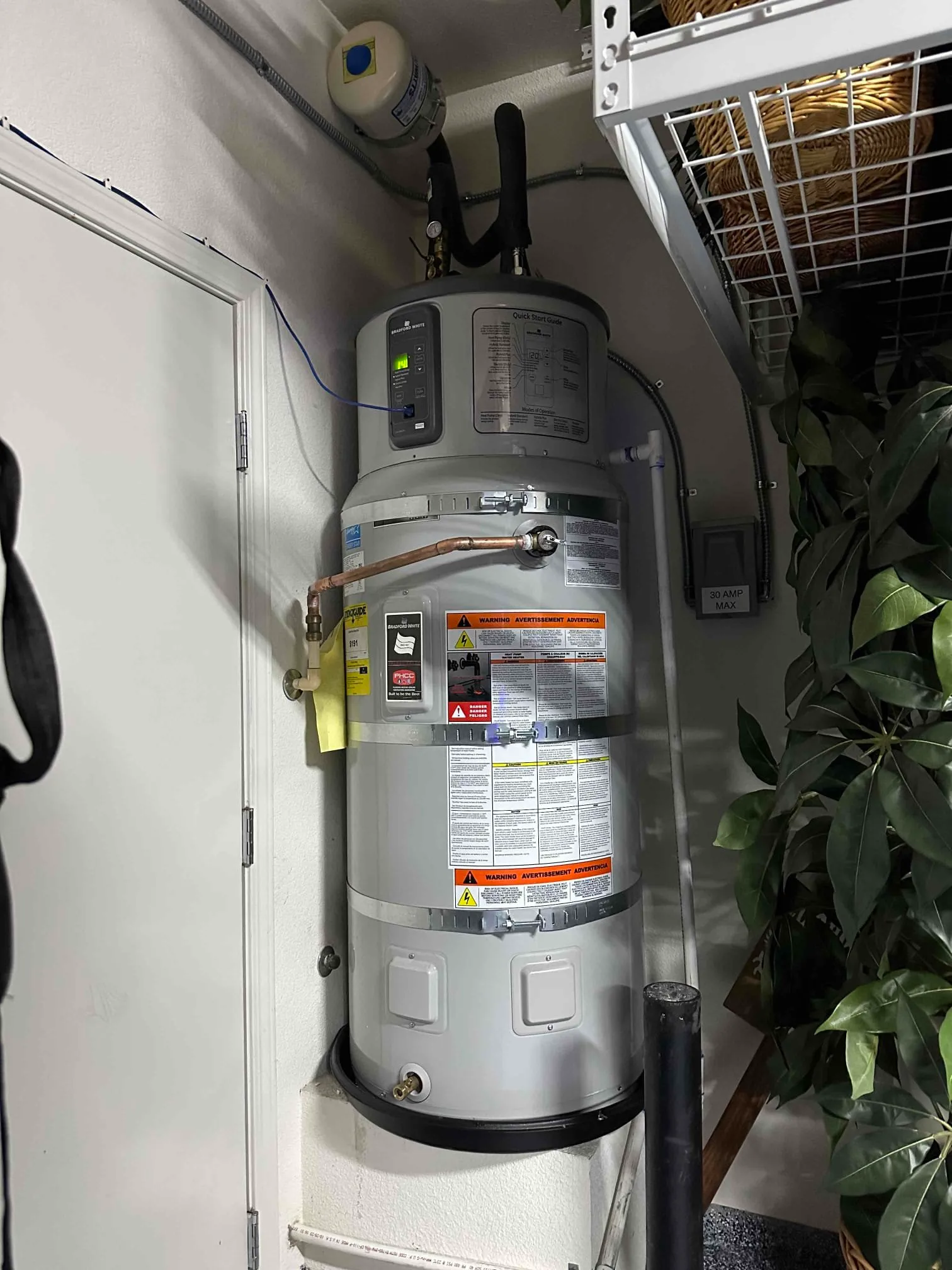
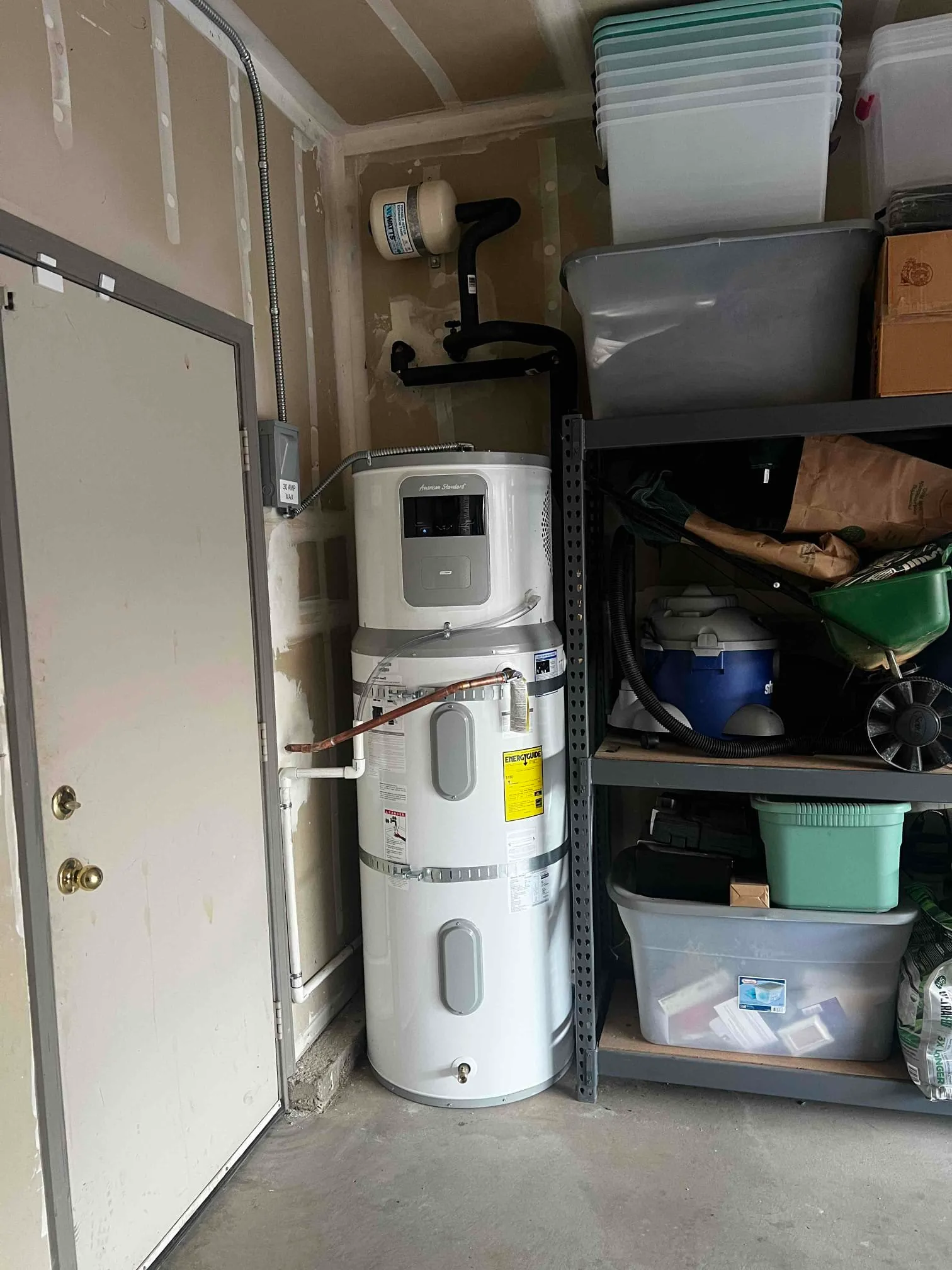
Are heat pump water heaters worth the investment in your area?
Yes. While the upfront cost can be higher than traditional models, most homeowners in your area see significant energy savings over time. A heat pump water heater can cut hot water costs by up to 50%, helping the system pay for itself in just a few years.
How long does a heat pump water heater usually last?
With proper maintenance, heat pump water heaters often last 12–15 years, sometimes even longer. This is several years more than many standard electric units, making them a reliable long-term choice for your home.
Can a heat pump water heater handle large households in your area?
Absolutely. Modern heat pump water heaters come in various sizes to match different household needs. For larger families in your area, a higher-capacity unit ensures there’s always enough hot water without overworking the system.
Do heat pump water heaters work in cold climates?
Yes, but performance can vary. Many models include hybrid settings that switch to standard electric heating when temperatures drop, ensuring consistent hot water no matter the season in your area.
Is professional installation required for a heat pump water heater?
We strongly recommend professional installation. Proper setup ensures efficiency, safety, and compliance with local codes in your area. Our team makes sure your new unit is correctly installed and ready to perform for years to come.
Local Electric Water Heater Installation
- Electric water heaters deliver consistent hot water whenever you need it, making showers, laundry, and dishwashing stress-free.
- With no gas lines or venting required, electric units are easier to install, safer to operate, and ideal for homes without natural gas access.
- Modern electric water heaters are designed to reduce energy use and can be paired with timers or smart controls to help lower utility bills.
- Electric water heaters are typically more affordable to install compared to gas models, with fewer parts to maintain and lower long-term service costs.
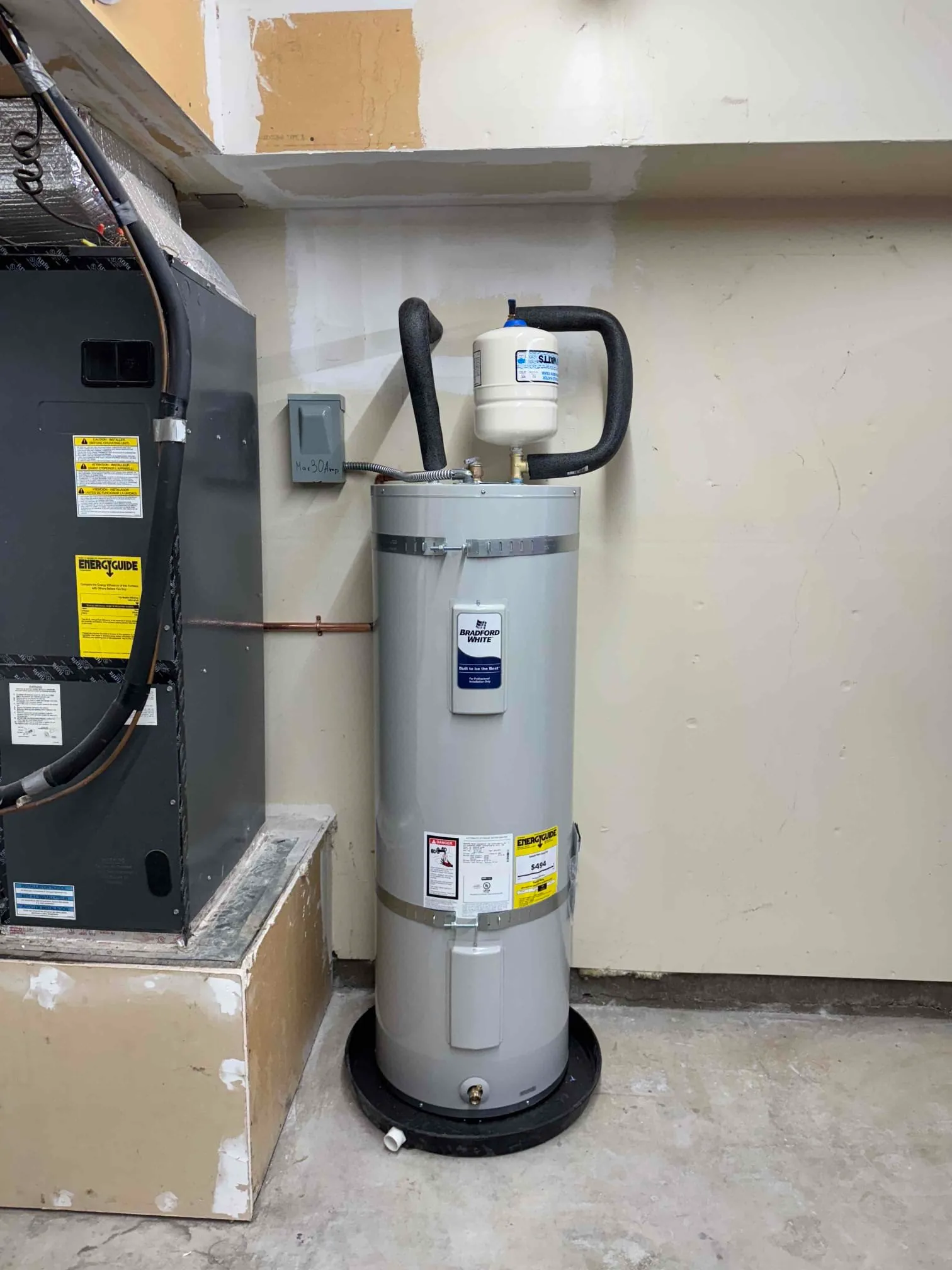
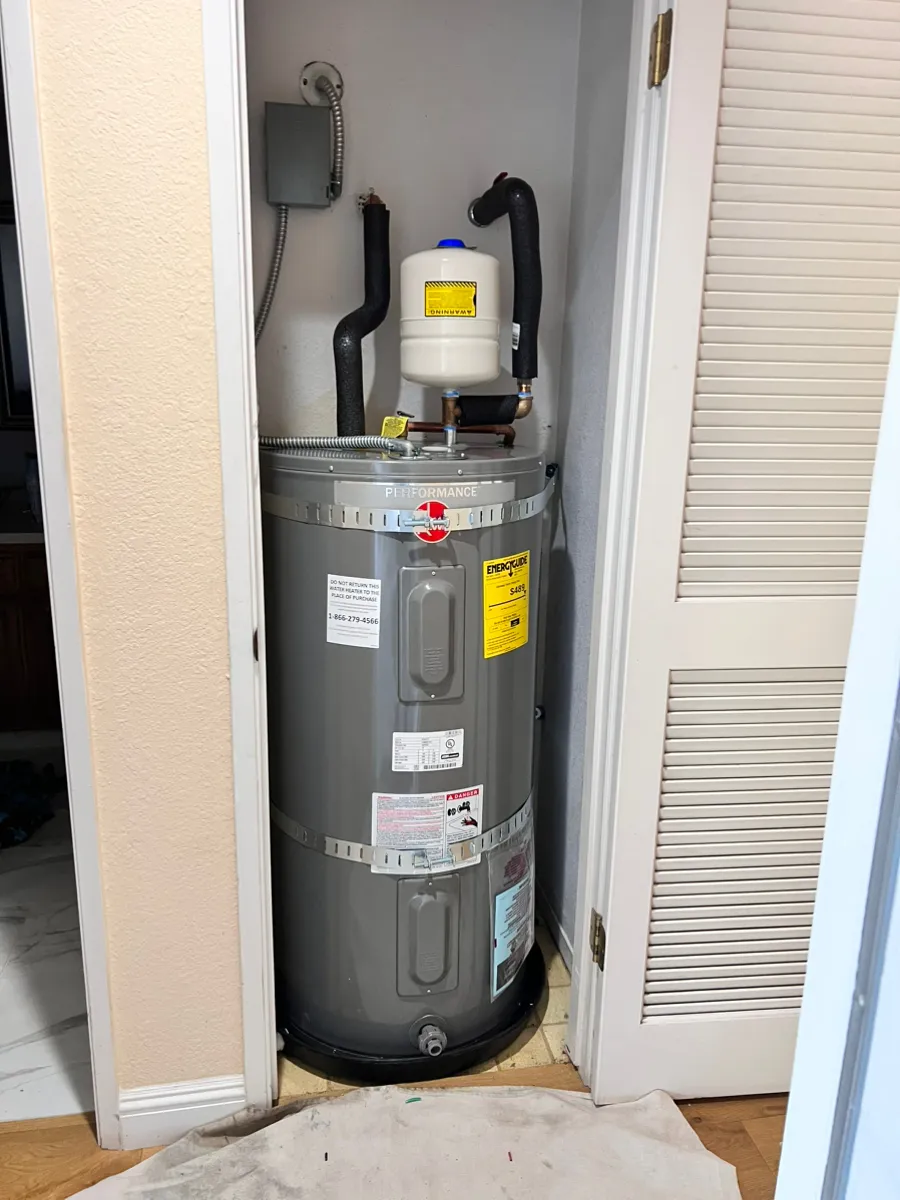
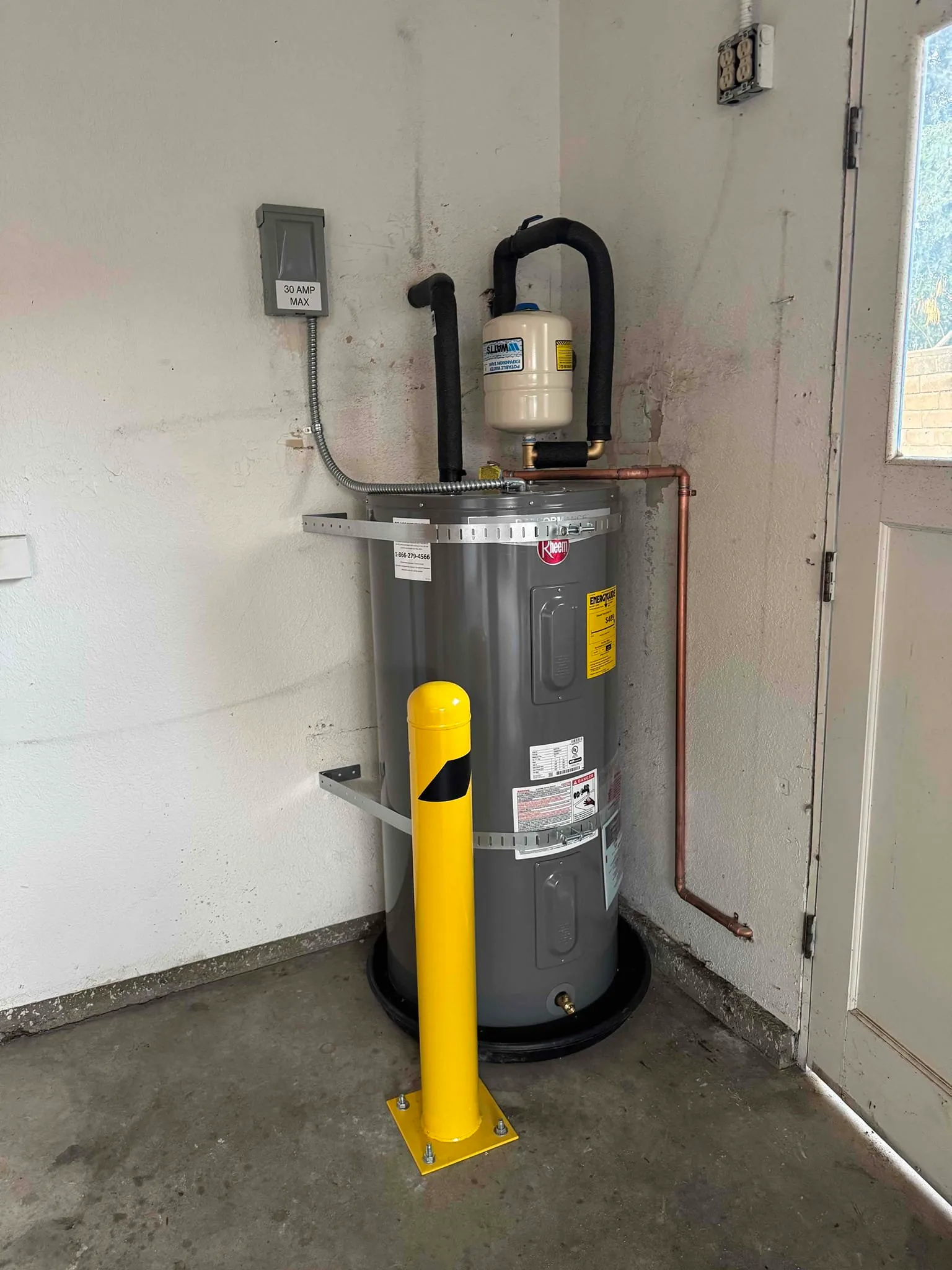
How long do electric water heaters usually last in your area?
Most standard electric water heaters last about 8–12 years. With routine maintenance like flushing the tank and checking the anode rod, you may extend its life even longer.
What size electric water heater do I need for my home?
The right size depends on your household’s hot water usage. A family of 2–3 might do well with a 40-gallon tank, while larger families often need 50–80 gallons to avoid running out during peak times.
Are electric water heaters energy efficient?
Yes. Electric water heaters convert nearly all of the electricity they use into heat. Many modern models are also insulated to reduce standby heat loss, helping lower utility bills.
When should I replace my electric water heater instead of repairing it?
If your water heater is over 10 years old, leaking, or no longer producing enough hot water, replacement is usually more cost-effective than repeated repairs.
Local Gas Water Heater Installation
- Gas water heaters heat water quickly, making them perfect for families with high hot water demand.
- They often cost less to run since natural gas is usually cheaper than electricity.
- Many models can still provide hot water during power outages.
- With regular maintenance, gas water heaters can last 10–15 years or more.
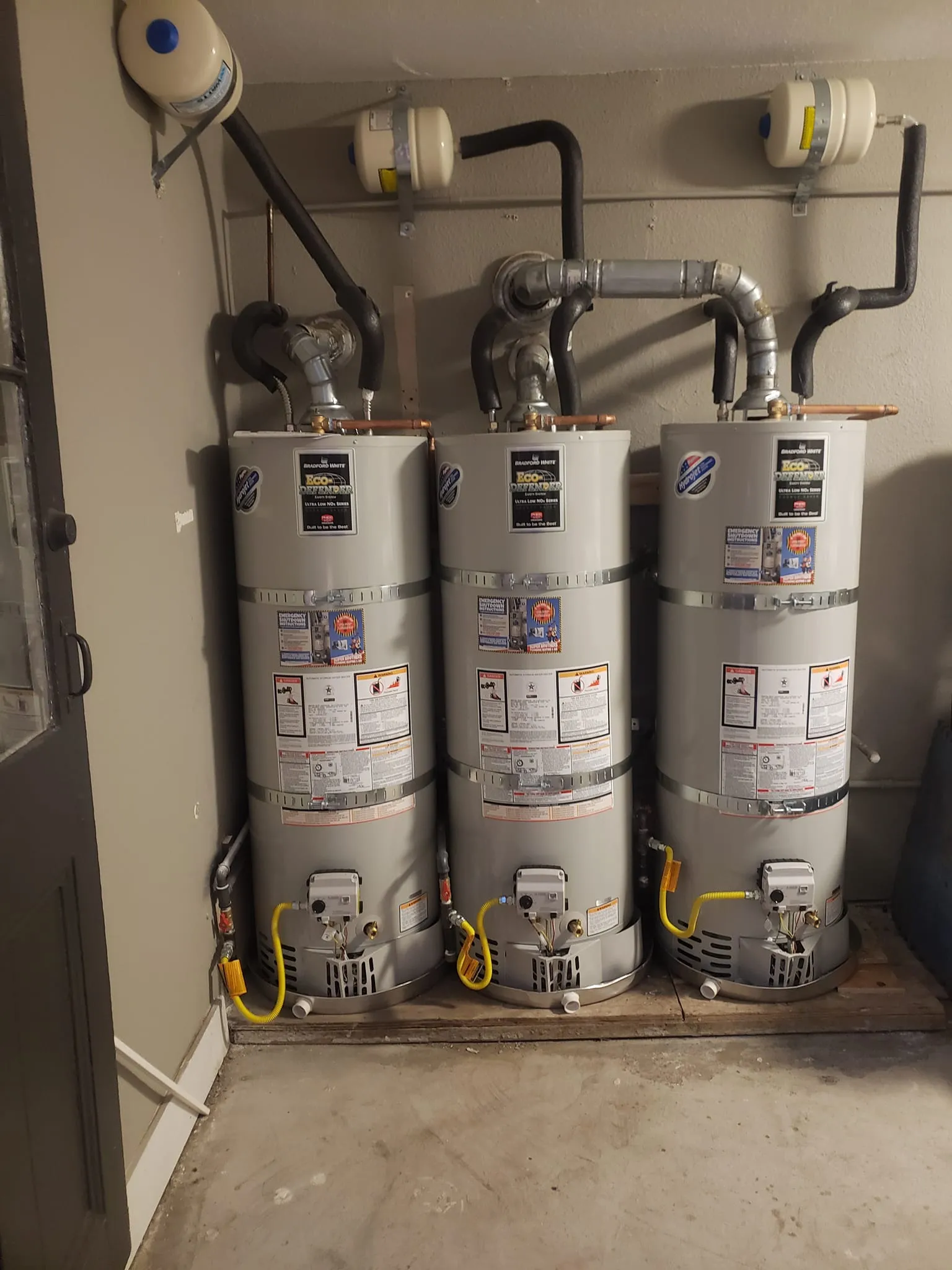
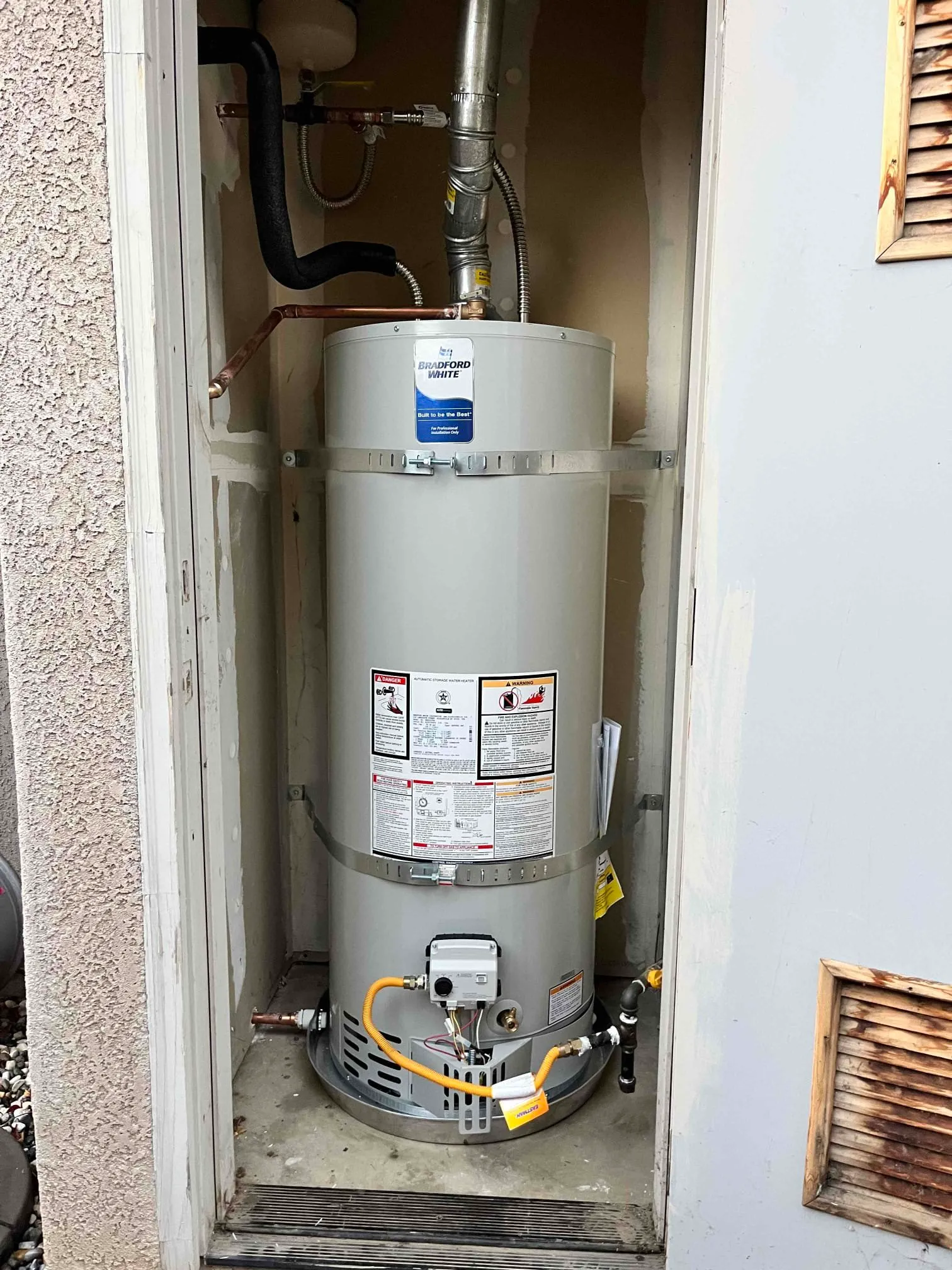
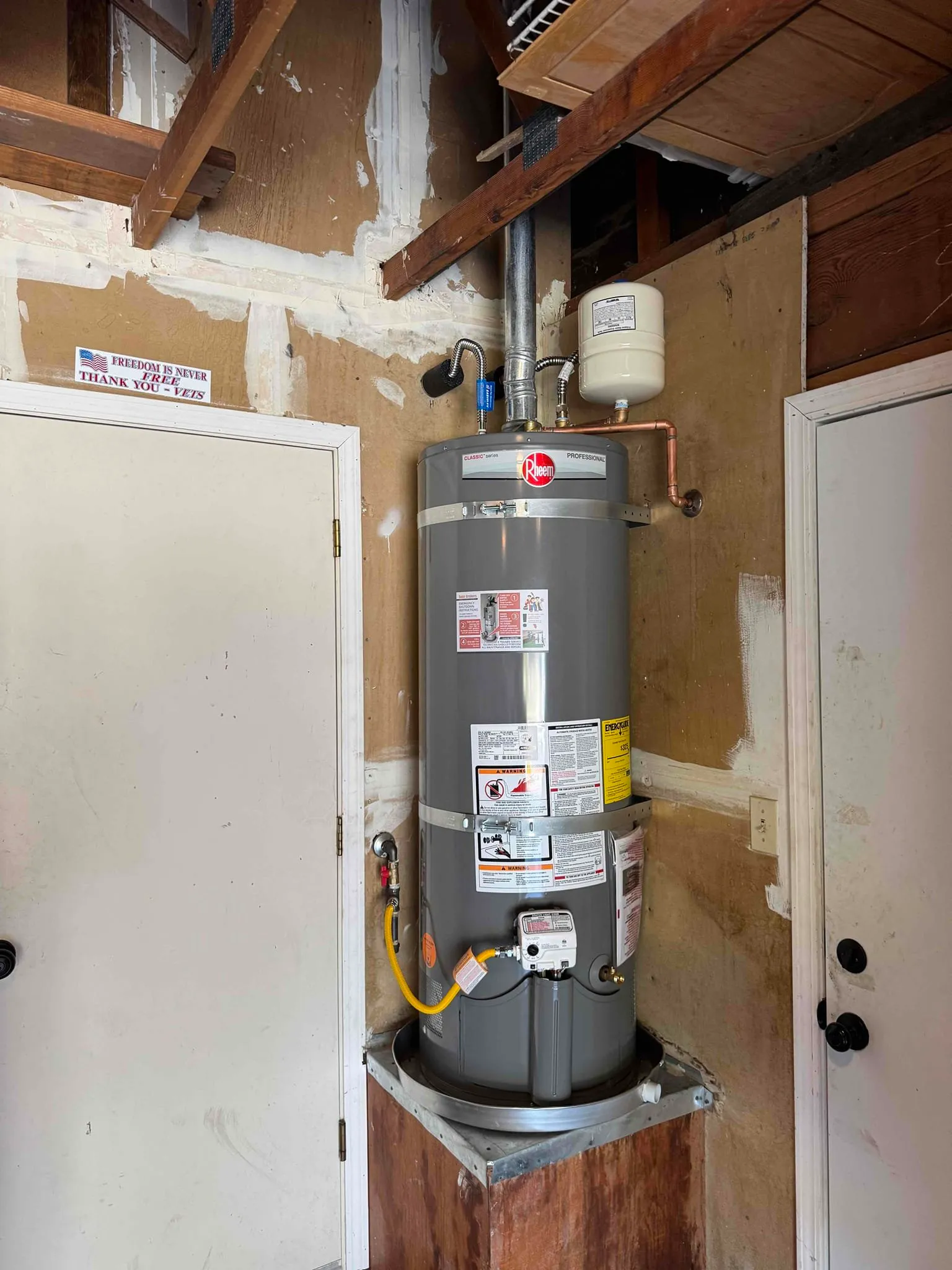
How often should I service my gas water heater in your area?
Annual servicing, including tank flushing and burner checks, is recommended to ensure efficiency and safety in your area's climate.
Can a gas water heater be installed in a small space?
Yes, compact models are available, but proper ventilation and clearance requirements must be met for safe installation.
How do I know if my gas water heater is energy-efficient?
Look for a high Energy Factor (EF) rating or ENERGY STAR certification to ensure lower operating costs.
What are the signs of a failing gas water heater?
Rusty water, strange noises, inconsistent heating, or frequent pilot light issues indicate it may need repair or replacement.
Are tankless gas water heaters a good option?
Tankless models provide endless hot water and save space but have higher upfront costs and require proper sizing for demand.
How can I improve the lifespan of my gas water heater?
Regular maintenance, such as inspecting the pressure relief valve and keeping the area clear, extends the unit’s life.
Do I need a permit for gas water heater installation in your area?
Most areas require permits to ensure compliance with local codes; check with Local authorities before installation.
Local Water Heater Repair and Maintenance
- Rapid troubleshooting for no-hot-water and temperature issues
- Tank flushing and sediment removal to restore performance
- Anode rod inspection/replacement to prevent internal corrosion
- Leak detection, valve replacements, and code-compliant repairs
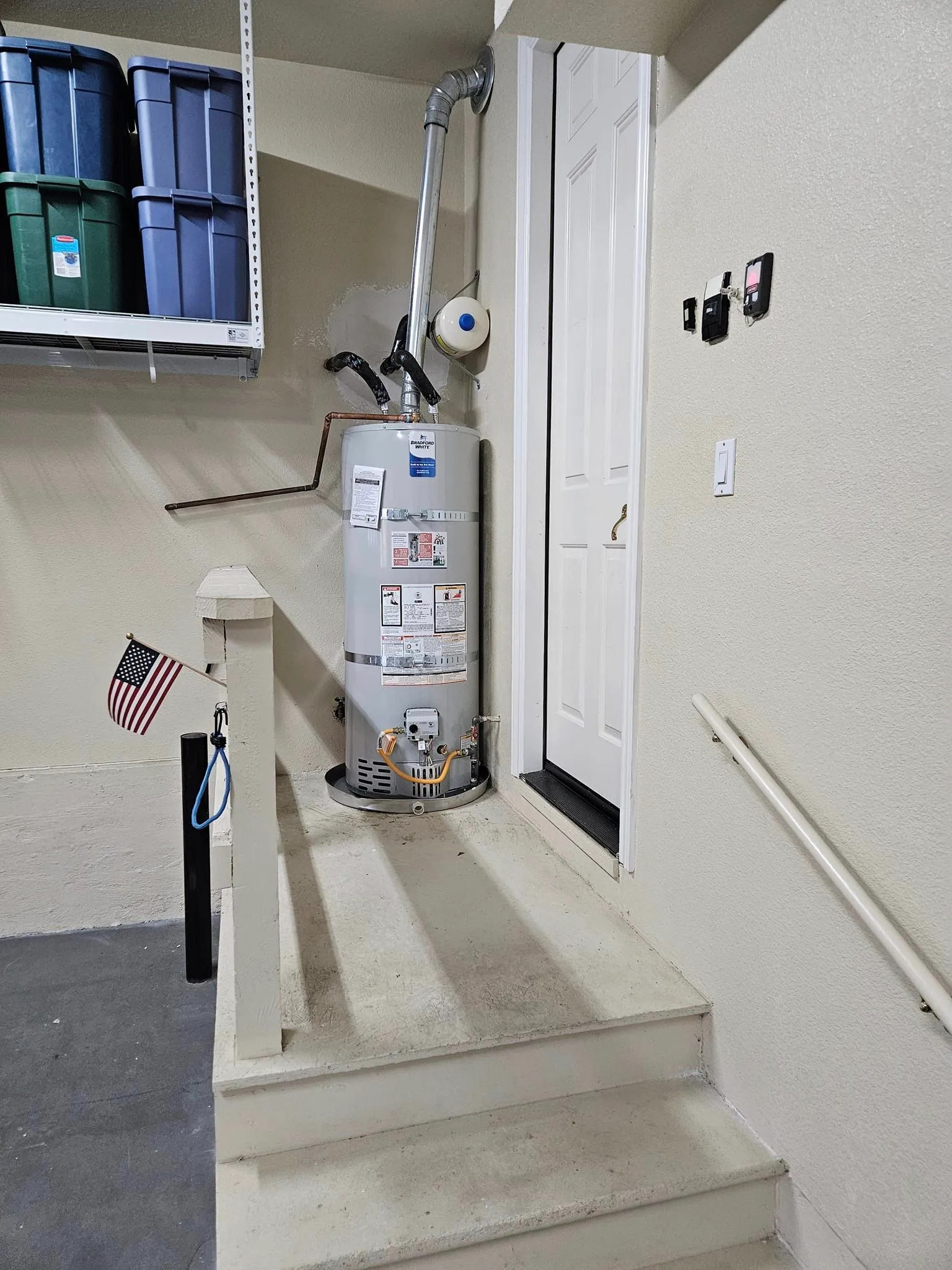
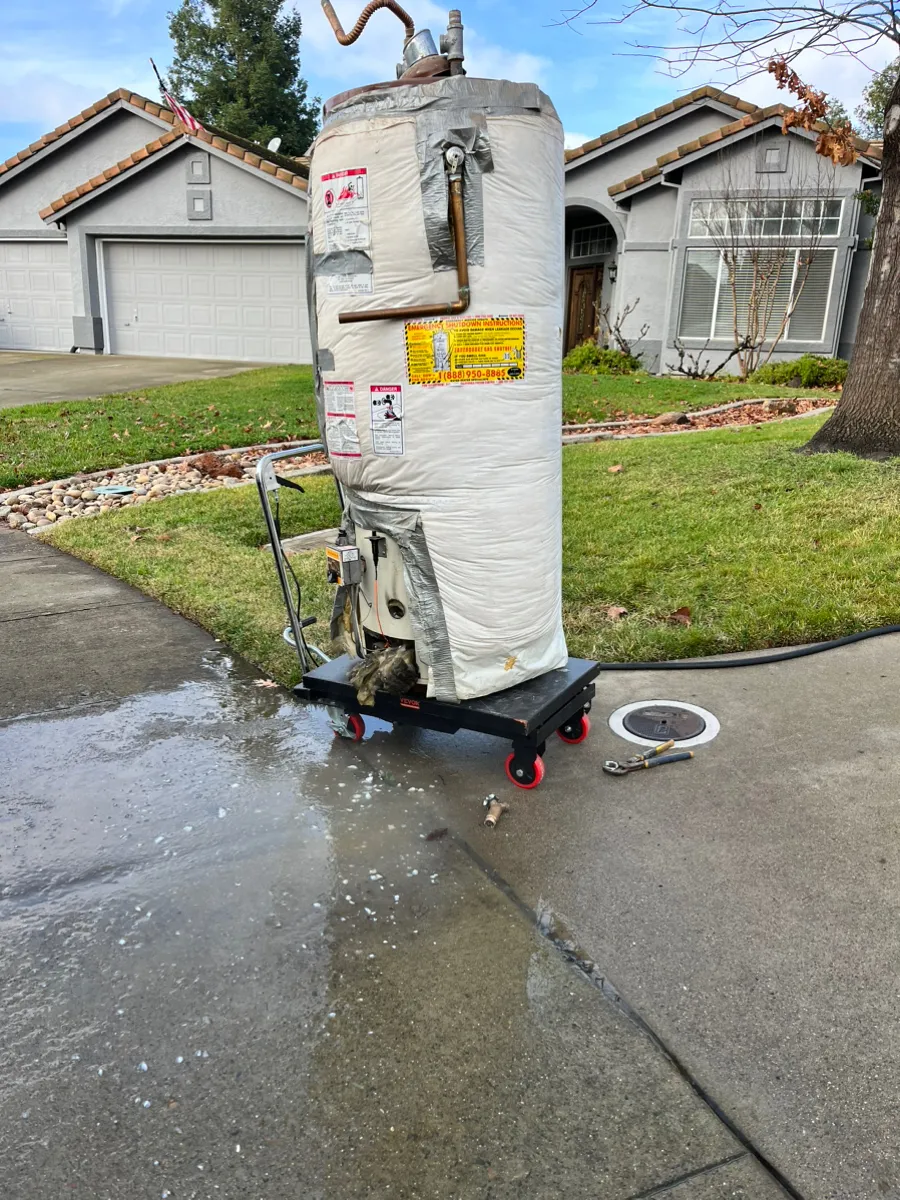
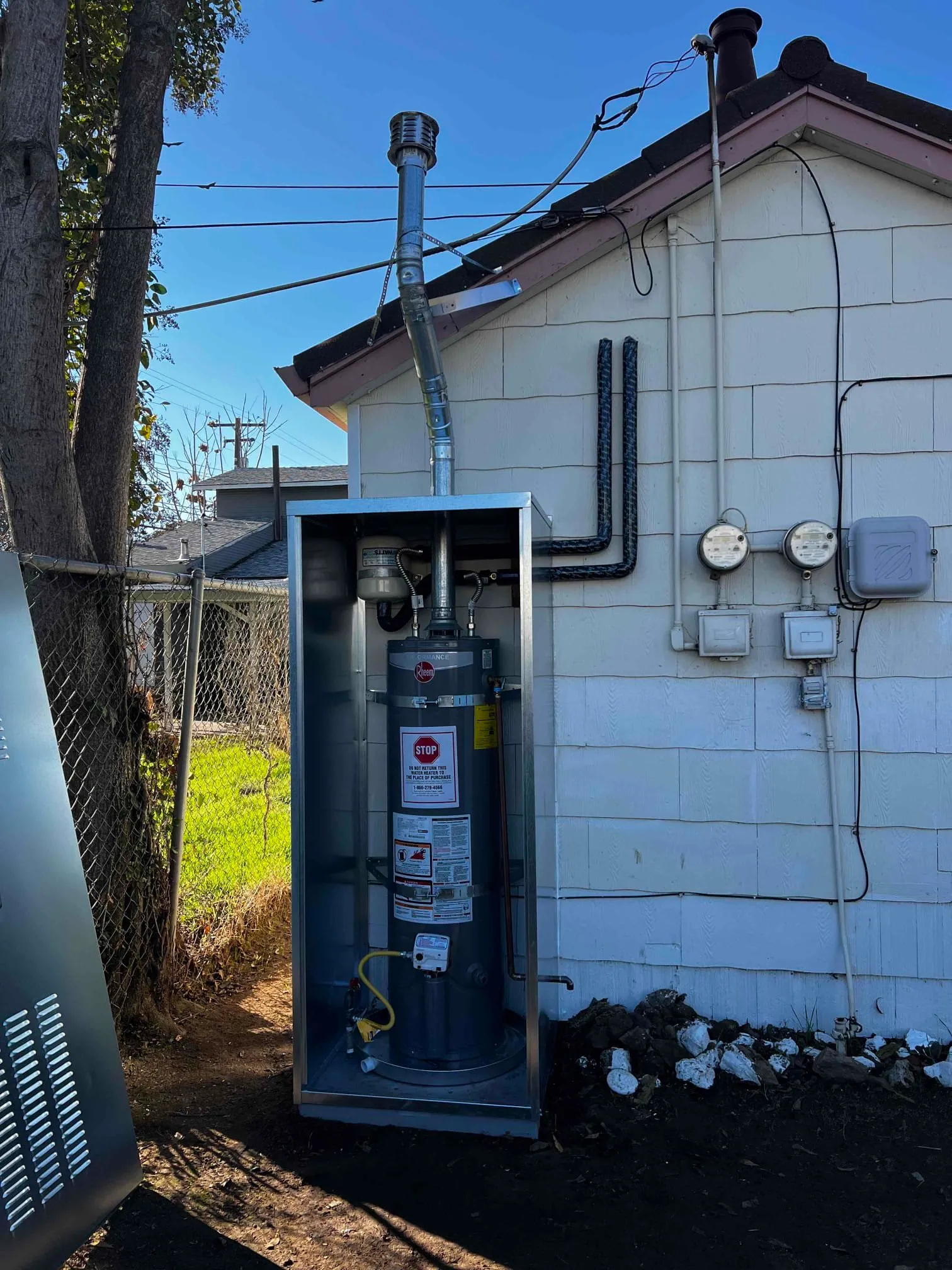
How often should I have my water heater serviced in your area?
We recommend scheduling a professional service every 6–12 months to flush the tank and check components, especially with Local's water conditions.
How can you tell if my water heater needs repairs?
Our technicians look for signs like fluctuating water temperatures, odd noises, leaks, or rusty water, which indicate a need for repairs.
Can your team repair my water heater, or should I replace it?
We’ll assess your unit’s condition; if repairs are frequent or the tank is leaking and over 10 years old, we may recommend replacement.
What maintenance services do you offer for water heaters?
We provide tank flushing, anode rod inspections, burner cleaning, and pressure relief valve testing to keep your unit running efficiently.
Why is my water heater making noises, and can you fix it?
Noises often come from sediment buildup or a failing component; our team can diagnose and resolve the issue with a flush or repair.
How do you improve water heater efficiency in your area?
We insulate tanks and pipes, adjust thermostats to 120°F, and perform regular maintenance to optimize efficiency for Local homes.
What should I do if my water heater’s pilot light won’t stay lit?
Call us to check for issues like a faulty thermocouple or gas line problems; we’ll ensure your unit is back in working order safely.
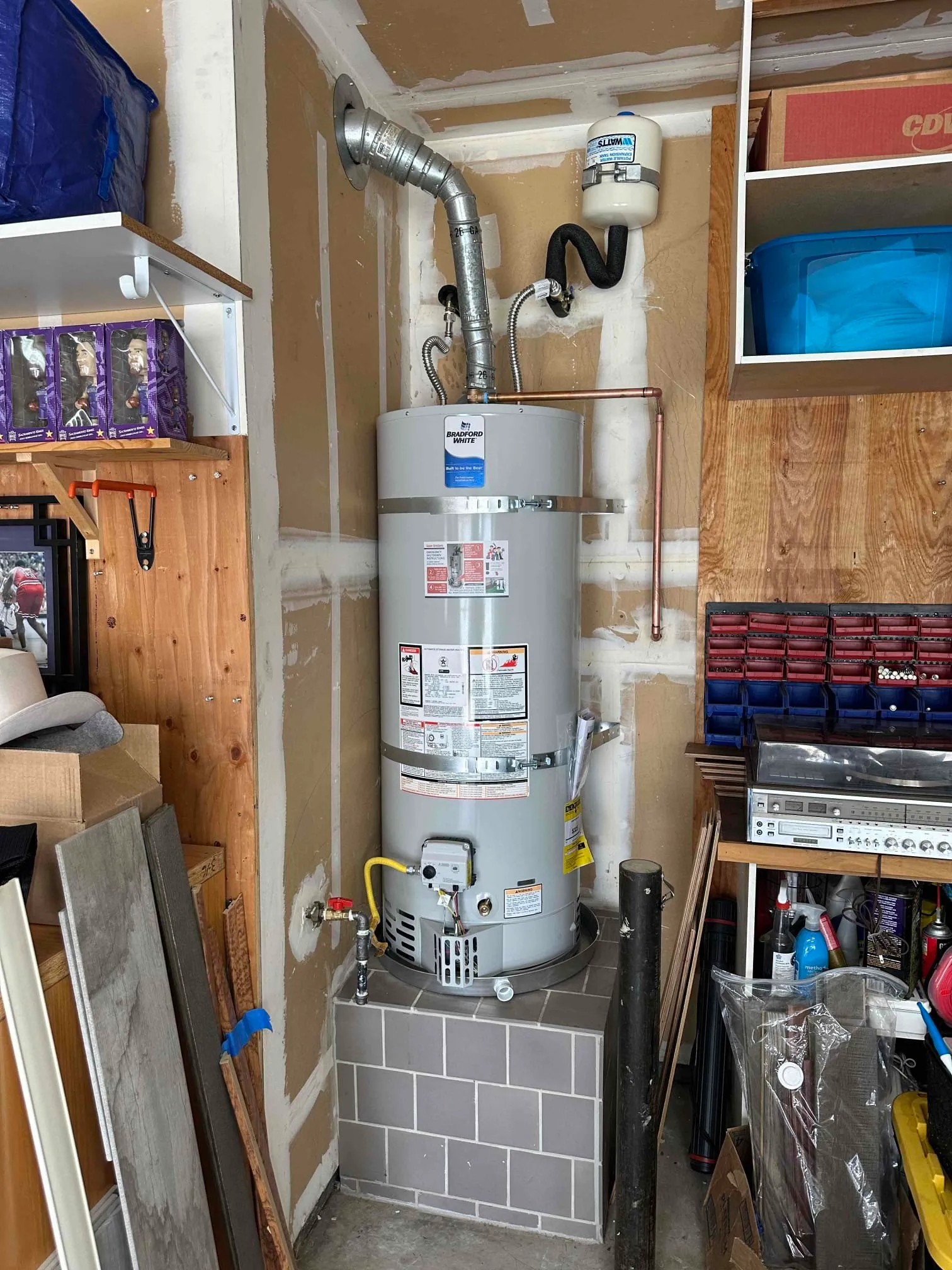
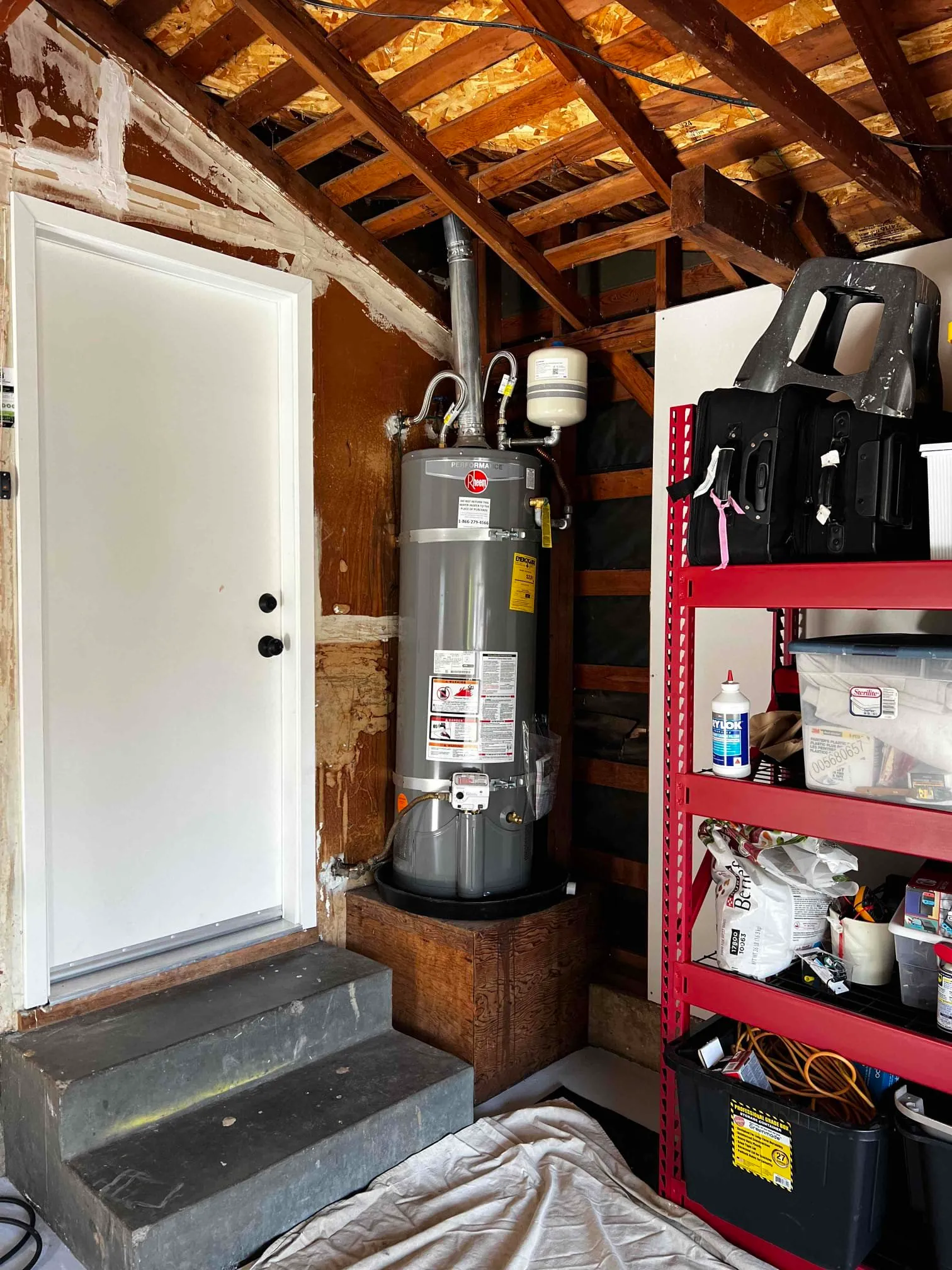
Why choose us?
Best Water Heater Replacement Company Near You
When it’s time to replace your water heater in your area, you deserve a company that makes the process simple, reliable, and stress-free. Our experienced team specializes in water heater replacement, ensuring you get the right unit for your home’s needs with expert installation. From removing outdated equipment to setting up your new system, we handle every step with care and precision so you can enjoy dependable hot water and lower energy costs for years to come.
We work around your schedule, protect your home, and finish on time—every time. No mess, no delays, just reliable results from licensed pros who care about doing it right.
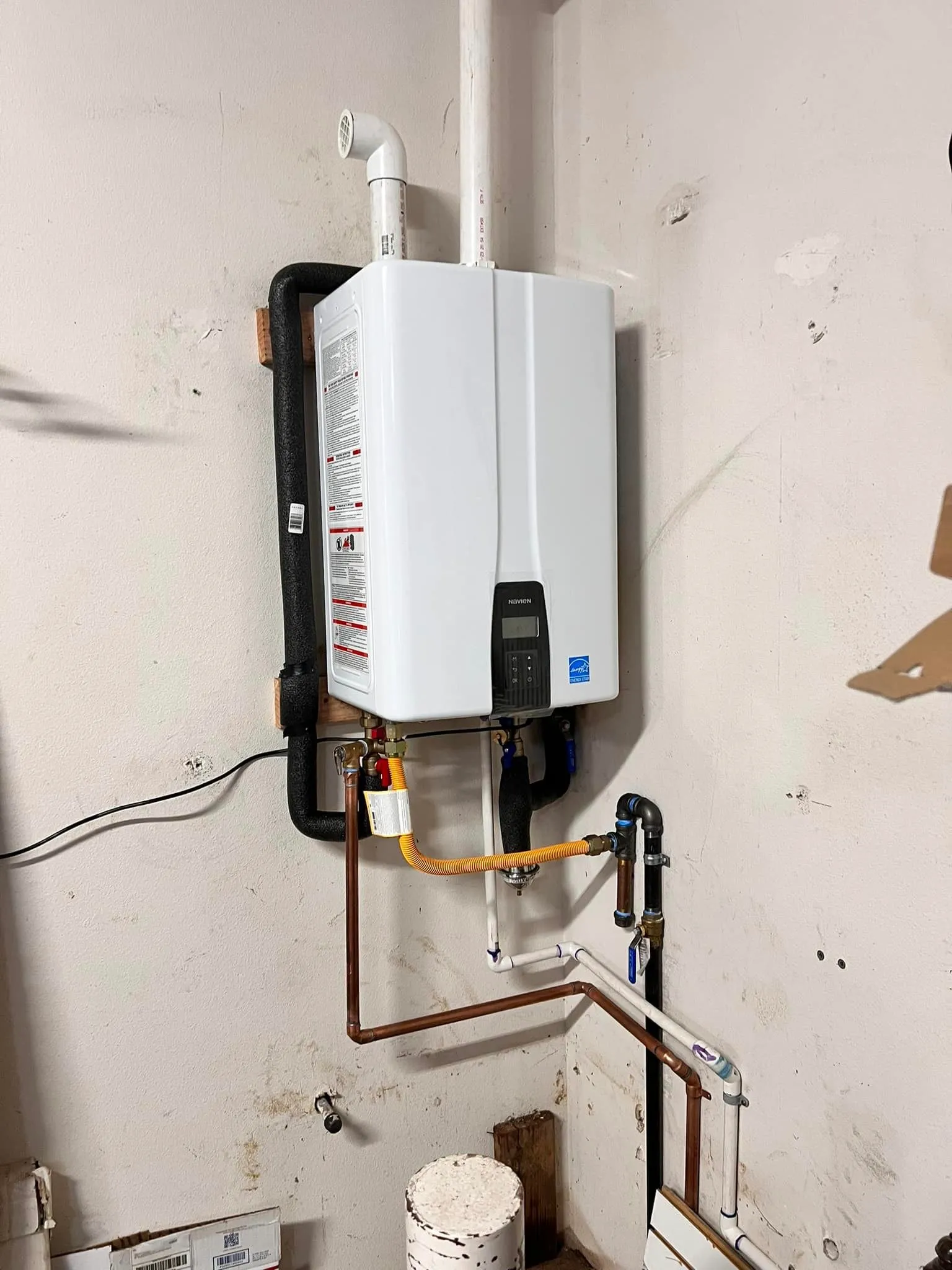
Endless Hot Water on Demand
Tankless water heater heats water only when you need it, so you’ll never run out during showers, laundry, or dishwashing.
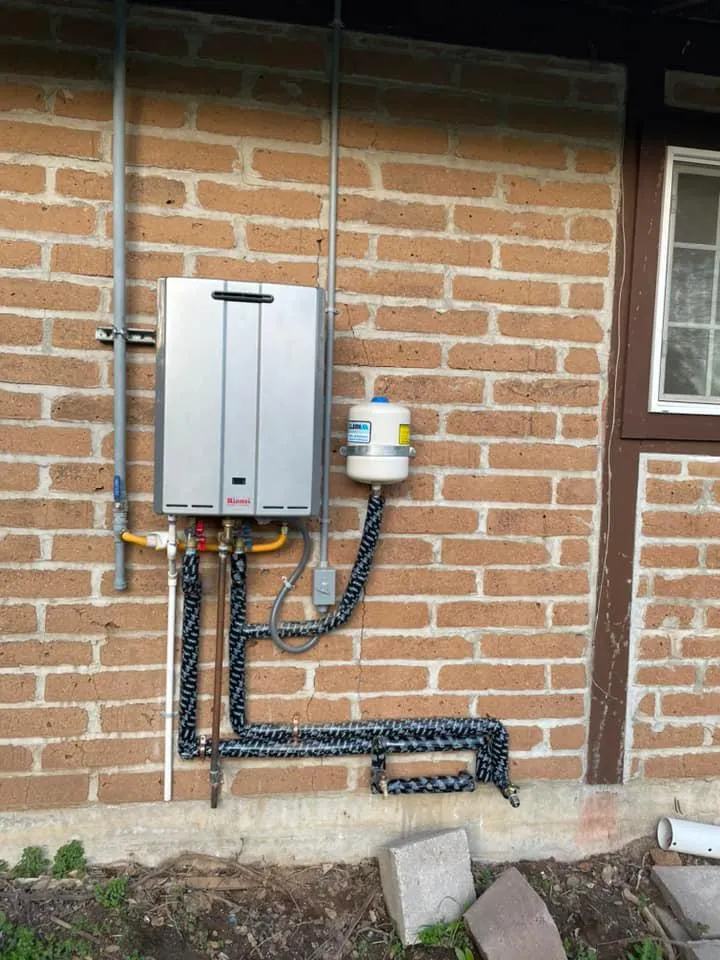
Space-Saving Design
Tankless water heater Compact units mount on the wall, freeing up valuable floor space in your Local home.
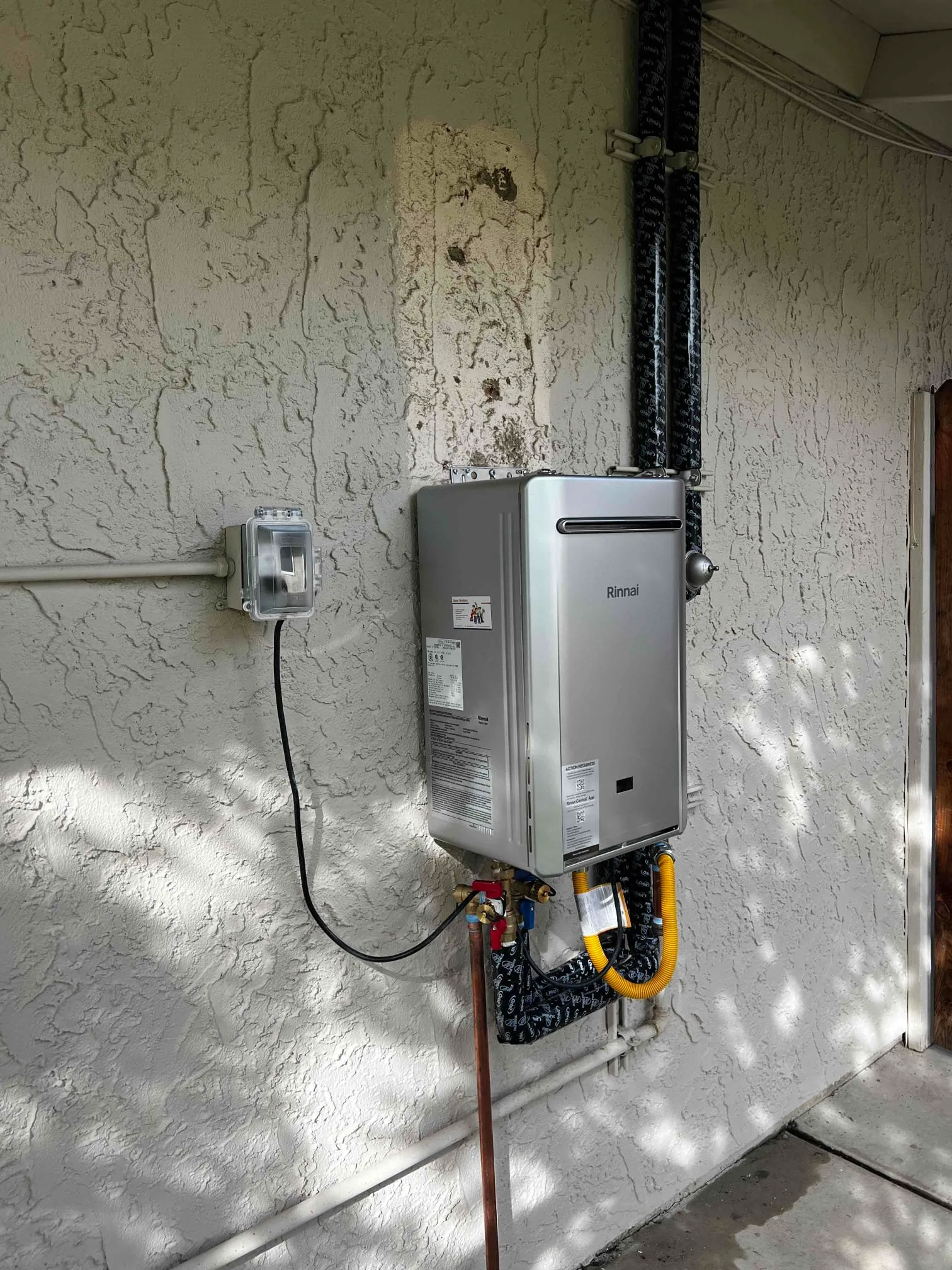
Lower Energy Bills
Tankless water heater uses less energy than traditional tanks by avoiding constant reheating, saving you money over time.
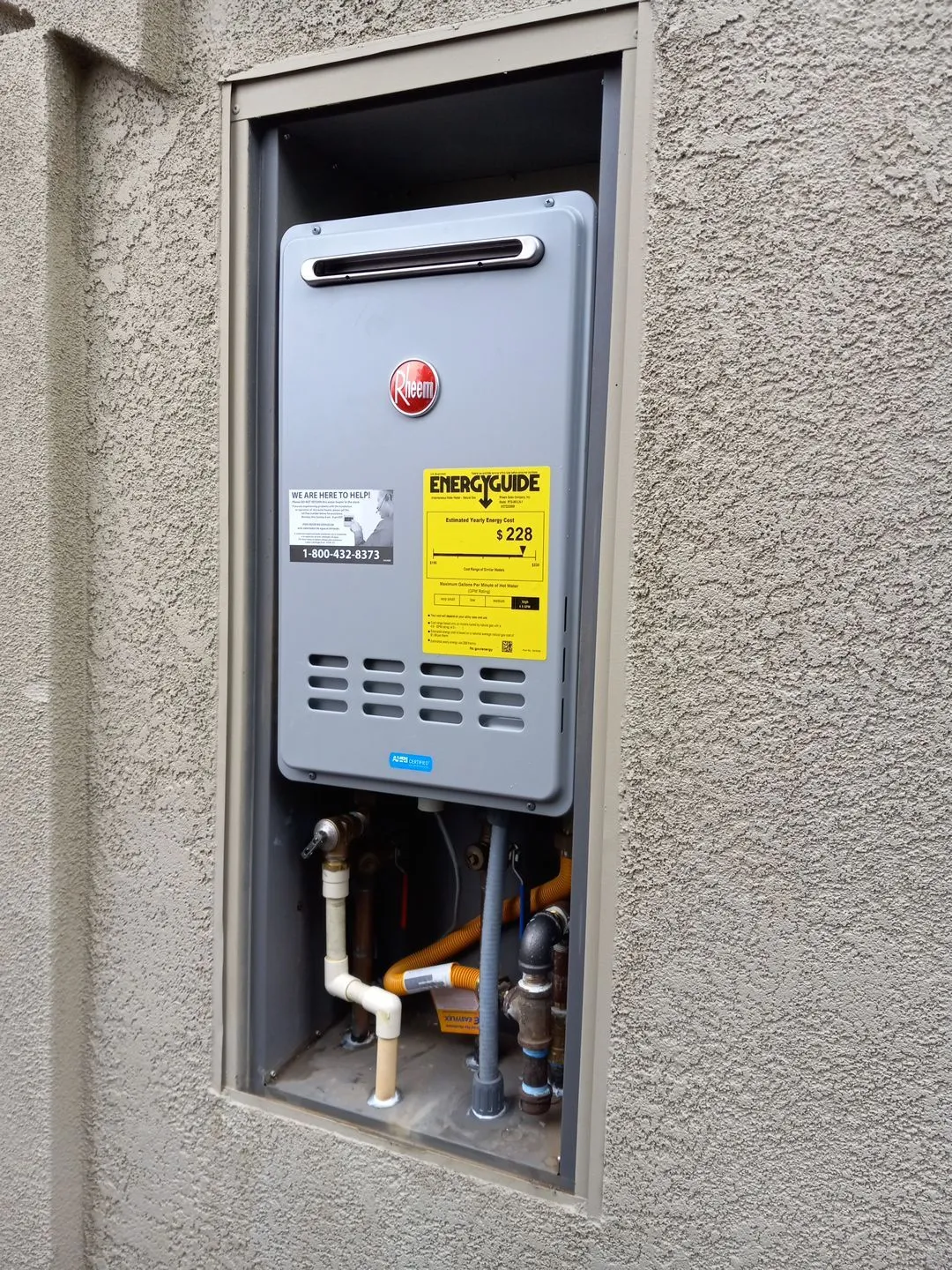
Longer Lifespan
With proper maintenance, tankless water heater models can last 20 years or more, outlasting most tank water heaters.
Local Water Heater Replacement Company
Choosing the right team for your water heater replacement makes all the difference. At Super Brothers Plumbing Heating & Air, homeowners in your area trust us for reliable service, clear communication, and expert workmanship.
Every home has unique hot water needs, and our experienced technicians take the time to match you with the system that fits your lifestyle and budget. From removing the old unit to installing and testing the new one, we handle the entire process with care and efficiency.
Whether you’re upgrading for better performance, looking to cut energy costs, or replacing a unit that no longer keeps up, we make sure your new water heater delivers dependable comfort for years to come.
Water Heater Replacement and Installation Price
The cost of replacing or installing a water heater in your area depends on several factors such as the type of system you select, the size of the unit, and whether extra work like piping or venting adjustments is needed.
Instead of surprise charges, we provide clear estimates that explain what’s included so you can plan with confidence. Whether you’re upgrading to a high-efficiency model or replacing a standard tank, our team ensures the job is done right at a fair rate.
Proper installation not only protects your investment but also helps extend the life of your system, giving you reliable hot water and peace of mind for years to come.
Water Heater Upgrades in your area
Upgrading your water heater in your area is a smart investment that improves safety, efficiency, and long-term reliability. With proper add-ons like safety pans, recirculating systems, or upgraded shut-off valves, homeowners can prevent costly damage and ensure a steady hot water supply. Considering Local’s hot summers and varying water demands, the right upgrades can extend the life of your system while keeping your home prepared for local building codes and energy standards. Never wait for hot water again. Protects water heaters from water leaks and runoff from temperature and pressure relief valve activation. To avoid damage when leakage occurs. The plumbing code requires that a water heater in a garage be protected from mechanical damage in one of two ways: by being installed behind a barrier or by being elevated. Lifting your water heater prevents flammable fumes and vapors from spilled gasoline or any other combustible fluid. With ProtectionPlus the 6-year limited tank warranty becomes 10-year. 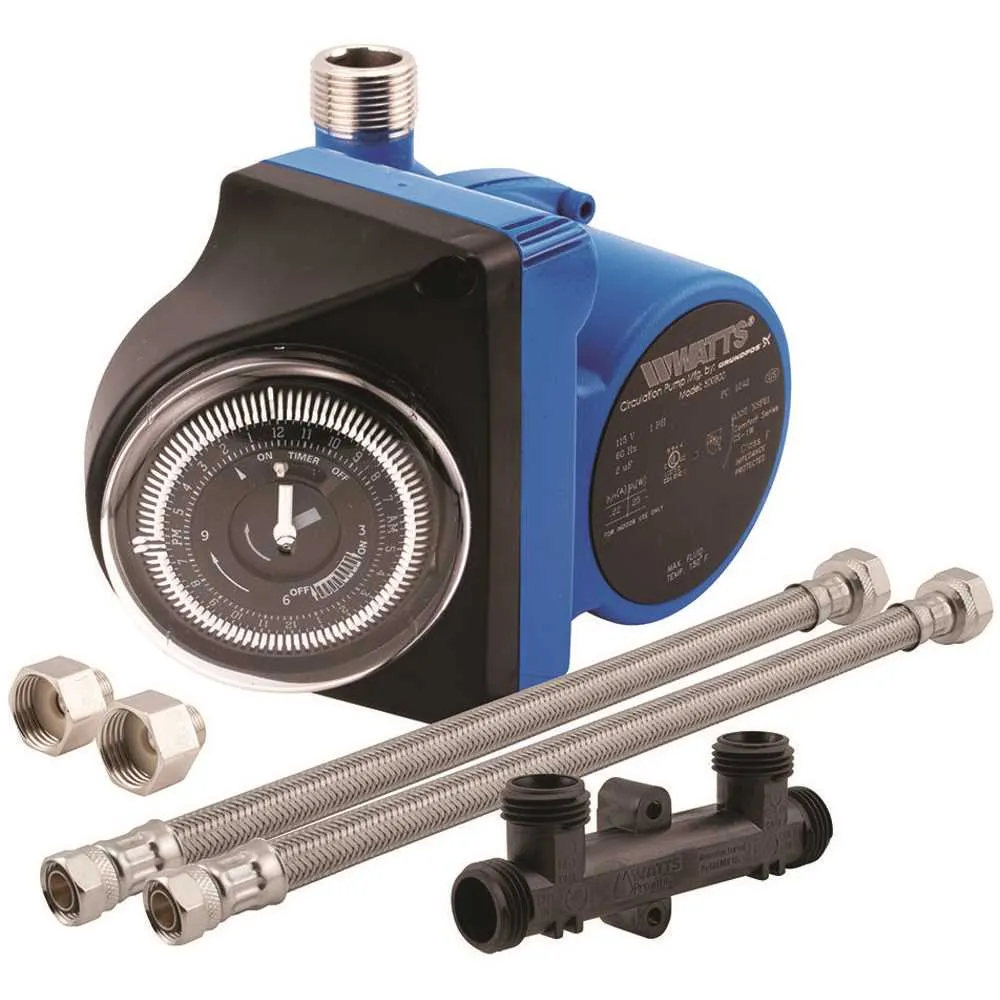
HOT WATER RECIRCULATING SYSTEM
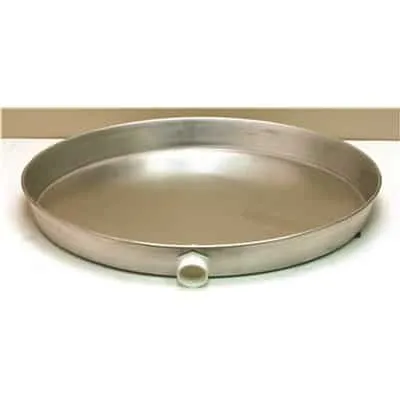
SAFETY WATER HEATER PAN
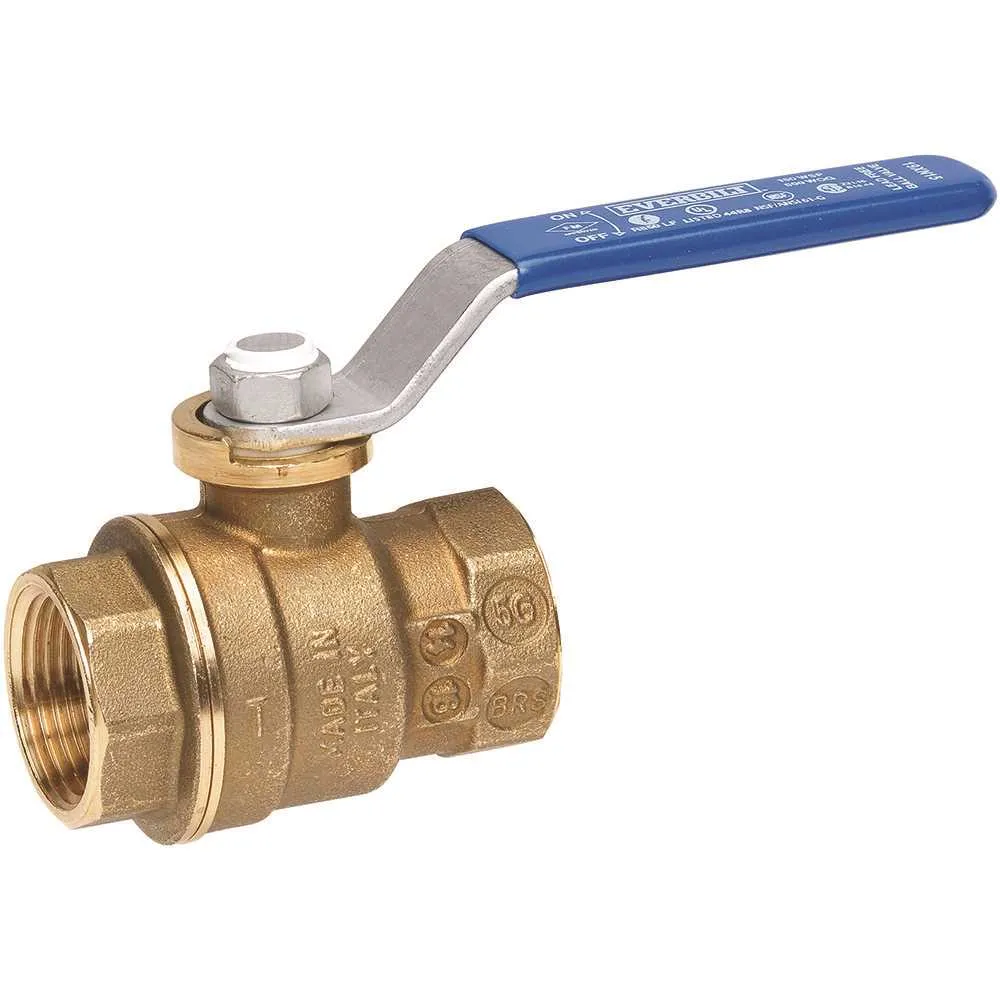
WATER SHUT OFF VALVE
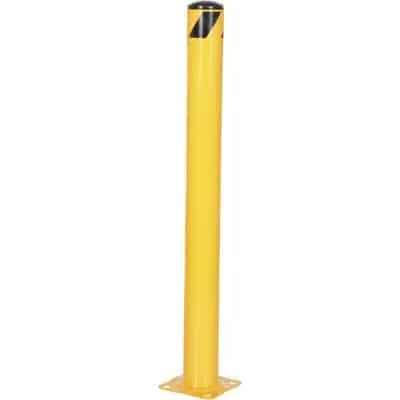
INSTALL BOLLARD
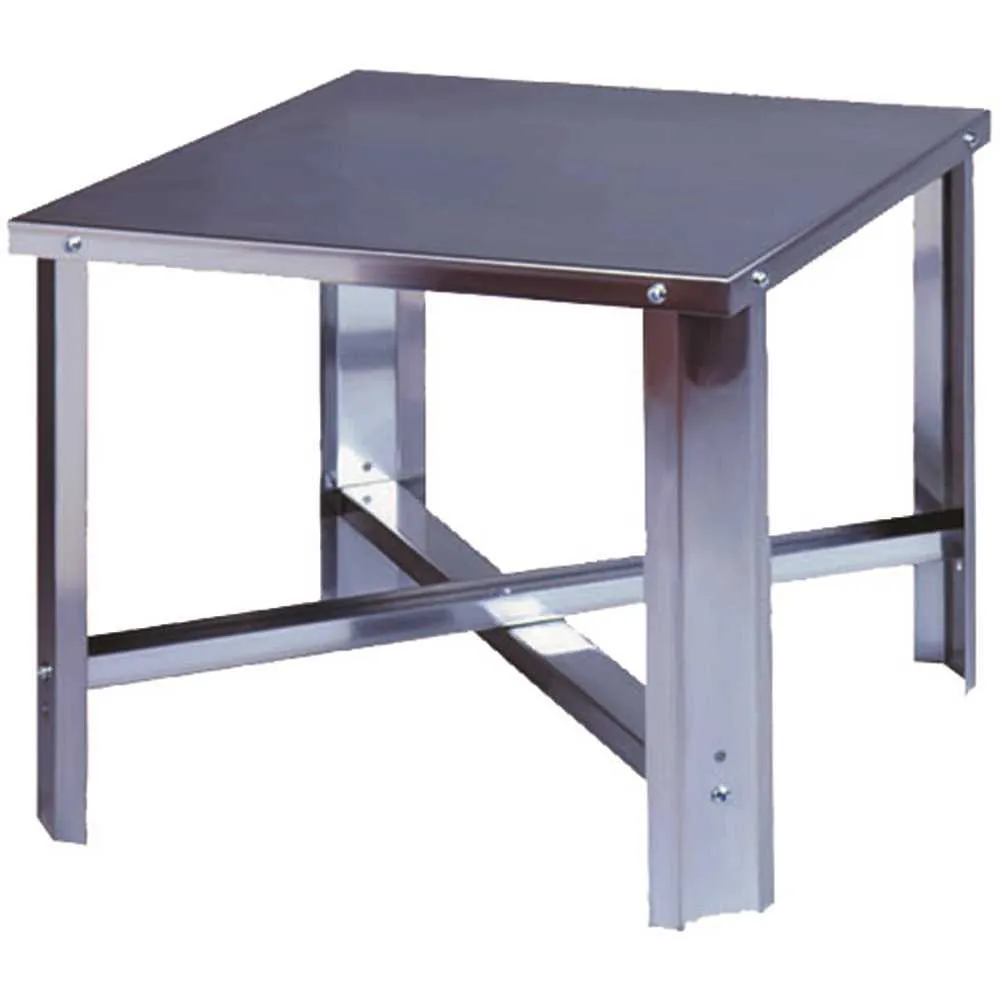
METAL W/H STAND
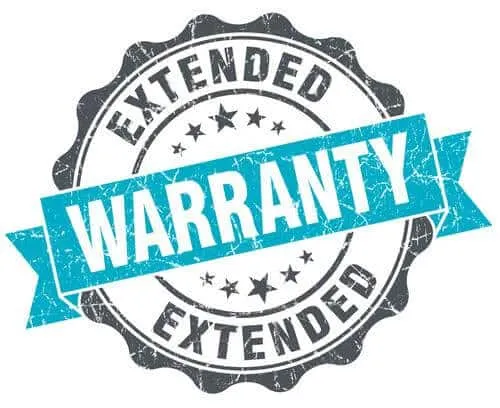
EXTENDED 4-YEAR WARRANTY
Water Heater Replacement Near Me
Finding a dependable team for water heater replacement in your area doesn’t have to be difficult. Our licensed technicians are local, experienced, and ready to help you upgrade to a system that meets your household’s needs.
By choosing a trusted nearby service, you’ll benefit from faster response times, personalized care, and the peace of mind that comes from working with professionals who know the area. Whether your current unit is leaking, inefficient, or simply past its prime, we provide timely replacements that restore comfort and hot water to your home.
Local Water Heater Contractor
Replacing or installing a water heater in your area requires more than just setting in a new tank. Local building codes often mandate permits and inspections, and we take care of the entire process so you don’t have to worry about compliance.
As a fully licensed and insured contractor, we handle every step with precision — from safe electrical or gas hookups to venting and proper removal of your old unit. You can trust the work is done to code and built to last.
Our focus is on high-quality brands like Rheem and Bradford White, known for performance, energy efficiency, and long service life. Pairing trusted equipment with expert installation ensures reliable hot water for years to come.
Choosing the right contractor means more than replacing a water heater — it means securing peace of mind, protection for your home, and confidence in a job done right.
Emergency Water Heater Service in your area
Hot water problems don’t wait for regular business hours, and neither do we. Our emergency water heater service in your area is designed to get your system back up and running quickly, no matter the time of day or night.
From sudden leaks and strange noises to a complete loss of hot water, our licensed technicians arrive prepared to diagnose the issue and provide reliable solutions on the spot. Safety and efficiency are always our top priorities, so you can trust the repair will be done right the first time.
We work on all major brands and models, including both gas and electric units, and carry the tools and parts needed to handle most problems in a single visit. When you need fast, dependable help, our team is ready to restore comfort to your home.
Signs It’s Time for a New Water Heater
in your area, hot summers and cool winter nights put constant demand on your water heater. If your system struggles to deliver consistent hot water after a long summer day or leaves you with lukewarm showers in the morning, it may be nearing the end of its lifespan.
Local water conditions also play a role. Many Sacramento-area homes deal with hard water, which accelerates sediment buildup in the tank. Over time, this buildup can cause popping or rumbling noises and shorten the heater’s efficiency. Rust-colored water or metallic-tasting hot water are also signs of corrosion that often can’t be repaired.
Small leaks near the base of the unit or damp spots around the water heater should never be ignored, as they can quickly turn into costly water damage. Likewise, if your energy bills in your area are creeping up even though your usage hasn’t changed, your water heater may be working harder than it should.
Finally, age matters. Most traditional tank water heaters last about 8–12 years. If yours is older and showing any of these warning signs, scheduling a replacement now can help you avoid sudden breakdowns during peak demand, when emergency service calls in your area are harder to book.
Rinnai Tankless Water Heater
Rinnai tankless water heaters are known for their exceptional reliability and advanced technology. These units deliver hot water on demand, eliminating the standby energy loss associated with traditional tanks. With sleek designs and compact sizes, Rinnai models save space while delivering consistent performance.
Homeowners appreciate Rinnai’s energy efficiency, which helps lower monthly utility bills while reducing environmental impact. Many models come with Wi-Fi compatibility, allowing you to monitor and adjust settings from your smartphone.
Rinnai systems are engineered for long service life, and when installed by Super Brothers Plumbing, Heating & Air, you get the benefit of professional setup, proper venting, and compliance with all local codes and permits. Whether it’s for a busy household or a smaller home, Rinnai offers a solution to fit your needs.
Noritz Tankless Water Heater
Noritz tankless water heaters combine compact designs with impressive performance, making them a great fit for homes of all sizes. These units are built to deliver an endless supply of hot water, even during high-demand periods.
Noritz models are recognized for their efficiency and long-lasting construction. Many feature low-NOx burners for environmentally friendly operation and a wide range of capacity options to suit different household sizes.
When Installed by us, your Noritz tankless water heater will be properly sized, expertly installed, and fully compliant with local regulations. Our clean, efficient service ensures you get reliable hot water and the peace of mind that comes with professional craftsmanship.
Navien Tankless Water Heater
Navien is a leading choice for homeowners who want top-tier efficiency and premium features in a tankless water heater. These units boast ultra-high energy factors, advanced condensing technology, and stainless steel heat exchangers for durability and performance.
One standout feature of Navien models is their ability to provide hot water to multiple fixtures simultaneously without temperature fluctuations. They also offer recirculation technology, which reduces the wait time for hot water at your tap, saving both water and time.
Choose Super Brothers Plumbing, Heating & Air for your Navien installation, Get a system set up to manufacturer specifications, with all required permits handled and every detail checked. Our local Local team ensures your Navien runs at peak performance for years to come.
Our Water Heater Replacement Guarantee
Choosing a new water heater can feel overwhelming, but we make the process simple and stress-free. From start to finish, our team manages everything—filing permits, working with city inspectors, and ensuring your installation meets all local building codes. That means no paperwork headaches or unexpected delays for you.
Every replacement is handled by licensed technicians who stand behind their work. With our guarantee, you’ll have confidence knowing your new system is installed correctly, safely, and built to last. Whether it’s a sudden breakdown or a planned upgrade, homeowners in your area can trust that their comfort and hot water supply are fully protected.
Tankless Water Heater Over a Conventional Model
If you’re constantly running out of hot water during showers or while doing laundry, it might be time to consider upgrading to a tankless water heater. Unlike traditional models, tankless systems heat water on demand, so you’ll never run out — even during peak usage.
High energy bills are another sign it’s worth making the switch. Tankless water heaters only operate when you turn on the tap, which can significantly reduce your monthly energy costs compared to a storage tank that runs all day.
Limited space in your Local home is also a factor. Tankless water heaters are compact and wall-mounted, freeing up valuable floor space in utility areas, closets, or garages.
If your current water heater is over 10 years old or showing signs of rust, leaks, or frequent repairs, upgrading to a tankless system can save you money and headaches in the long run. You’ll get modern efficiency, reliable performance, and a longer lifespan with proper maintenance.
Water Heater Frequently Asked Questions
What are the signs I need a water heater replacement?
Lukewarm or inconsistent hot water, rumbling noises, rusty or discolored water, frequent repairs, rising energy bills, or leaks around the tank are all red flags.
How long does a water heater usually last?
Traditional tank units typically last 8–12 years. Tankless systems can run 15–20 years when maintained properly.
Do I need a permit to replace a water heater in your area?
In most California cities, yes. We handle the permit and coordinate inspections so your installation meets local building codes.
How long does installation take?
A straightforward replacement is often completed in 2–4 hours. Relocations or upgrades to gas, venting, or electrical can take longer.
Should I choose a tank or tankless water heater?
Tanks cost less upfront and work well for steady use. Tankless units save space and energy and provide on-demand hot water, but have higher initial costs.
What affects the cost of water heater replacement?
Unit type and size, efficiency rating, brand, location of the heater, code upgrades, permit/inspection fees, and any plumbing, gas, or electrical changes.
How often should I service my water heater?
Once a year is ideal: flush sediment, inspect the anode rod, check safety valves, and verify thermostat, venting, or combustion air.
Is it better to repair or replace an older unit in your area?
If the tank leaks, repairs are frequent, or the unit is near end-of-life, replacement is typically more cost-effective than ongoing fixes.
Super Brothers Quality
Choose Super Brothers Plumbing Heating & Air because we use top-tier materials, deliver honest workmanship, and back every job with a real warranty. Our pricing is fair and transparent—no hidden fees, ever.
We pull the right permits, build to California code, and pass inspection. Our licensed, highly experienced team handles full plumbing and heating/air replacements and installations, so the job’s done right the first time.
- Top-tier materials
- Honest, quality service
- Workmanship warranty
- Fair, transparent pricing (no hidden fees)
- Permits handled; California code compliant; passes inspection
- Licensed & experienced in plumbing and HVAC installs
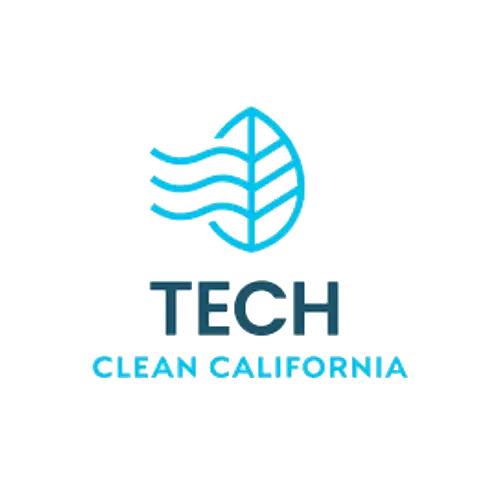

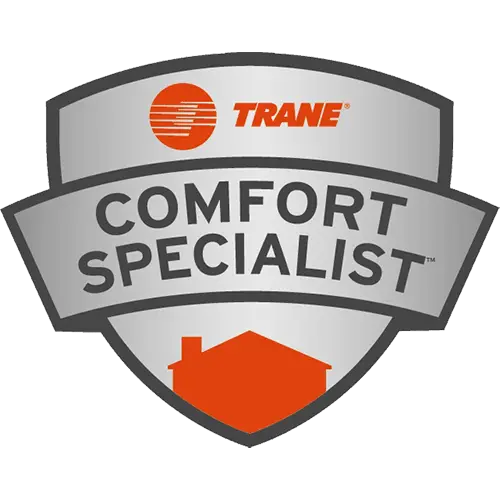

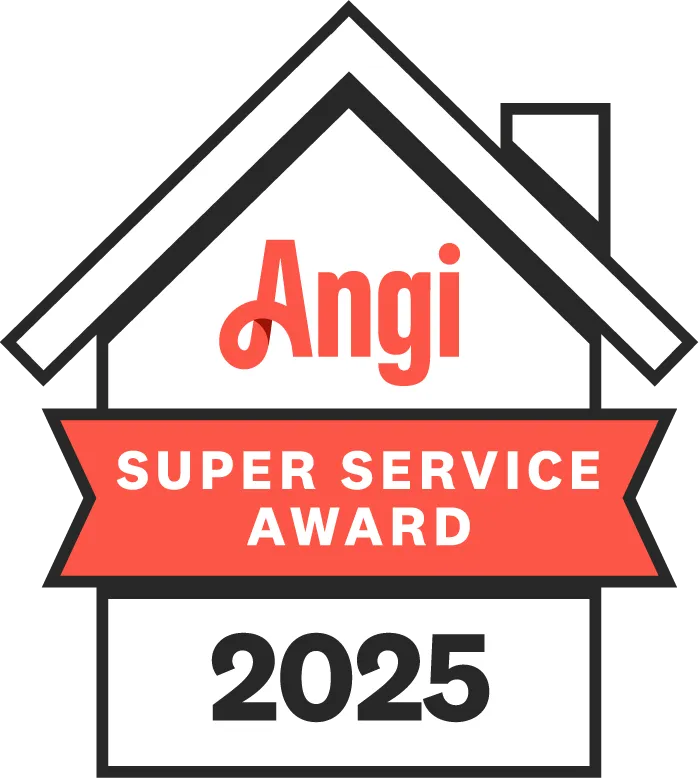
Refer Friends, Reap Rewards

Share our expert plumbing services with friends and family. For every successful referral, you earn cash rewards. Refer Now
Financing Options
Super Brothers Customers Say...
Andrii - our plumber - went above and beyond and was extremely patient with my Nana and my elderly mother. He gave a quote which I approved -…
Shout out to Serge who showed up the same day we reached out, was friendly and professional and worked very hard to fix a complicated clog in our…
Boris replaced my water main valve. He did a great job and I will be using SuperBros for any new projects in the near future.
Showed up on time, respectfully put booties on replaced the garbage disposal tested it then had me to test it and then wished us a great day.
They run a very efficient and responsive business and they came out quickly to work on my gas water tank. Andrew was super nice and thorough and explained…
More Reviews
Friendly staff and top-notch results.
Super Brothers has always been reliable efficient and affordable. I recommend this company to anyone who needs plumbing work.
Did such an amazing job the heater is beautiful. He got it in quickly. It works sufficiently thank you so much for all your help.
I've used Super Brothers multiple times and recommend them. I've had two water heaters replaced, a third worked on, and other plumbing work (in different properties over the years, not in the same house. That would be a lot of work for one house!). They are professional, fast, and reasonably…
Amazing! In spite of the disaster of having my living room flooded with water from a broken water heater, I had a smooth, swift, and peaceful experience. Serge was my tech and was very professional, respectful, clean, and did meticulous work. I'm thankful.
Super brothers installed my new electric water heater.amazing Job and great price I highly recommend them. thank you very much
Our bathroom faucet was loose and leaky. Boris installed a new bathroom faucet meticulously! It only took him about an hour from arrival to departur, and he was clean, and did a great job. Thanks, Boris!
Incredible service from start to finish! Extremely professional, kind and informative. Would recommend to anybody. Thank you Super Brothers, you saved us!!
We are SO pleased with this company! We got a RIDICULOUS $3000 quote from another company to fix our shower cartridge, so I reached out to Super Brothers to see what they would charge because Google says it should only cost between $200 and $400. They quoted me $285 plus…
Super Brothers has been our Go To plumbers for several years. They are professional, efficient, and very knowledgeable on all aspects of plumbing and air conditioning. This last visit was to determine the origin of two separate leaks and repair them. Bothe leaks were quickly identified. One was immediately repaired,…
Great service installing our new sink. Thanks Boris and everyone at Super Brothers Plumbing Heating & Air.
Had an issue with our toilet the super brothers teams was super responsive and able to come out with a tech very quickly. Boris shower up and was very professional and informative of the steps he was going to take to resolve our issue. Went above and beyond to ensure…
They replaced my faulty stopper in my bathroom sink with a popper that works better than the original. The price was very reasonable compared to their competitors and they were on time, friendly, and professional.
They handled everything quickly and kept me updated.
Professional, kind, and got the job done right the first time. A+ service.
I had a great experience with this company for my water heater installation. Their pricing was very competitive, and the installation team was professional, efficient, and did excellent work. The staff was very responsive and always quick to answer any questions I had, which made the whole process smooth and…
very knowledgeable and professional all around!
We had 2 gas water heaters replaced with heat pump electric water heaters. The job was done efficiently and all cleaned up afterwards. Very satisfied with Boris and Artem.
Scheduling was easy and the tech explained everything clearly.
Super Brothers did a great job. Mike completed the taken care of exactly what was needed. the result was great. I only did it look good, but had us up and running back on our own water supply within a couple hours while he finished the installation. Explained everything to…
I have used Super Brothers twice in the last couple of years, i truly enjoyed the prompt services they provided, and am very happy with their professionalism and work. Everyone (Karen, Kathy, Dimitar, Boris, Nick, Val, just to name a few) that i had come across are very knowledgeable, courteous…
Quality work and fair price. Will use again.
Couldn’t be happier. Quick response time and the work was spotless. Highly recommend!
Very professional and courteous technicians who diagnosed the water leak right away and repaired it with minimum downtime!

Every job is 100% satisfaction guaranteed.
It’s our promise.
We take every step to make sure you are fully satisfied with your service, contact our office if you feel otherwise and we will make it right!

Get A Quote
Let’s Help You Safeguard Your Home
We Offer Water Heater Replacement In Nearby locations
- Alamitos
- Alum Rock
- Antelope
- Arden-Arcade
- Atherton
- Auburn
- Berryessa
- Cambrian park
- Cameron Park
- Campbell
- Carmichael
- Citrus Heights
- Coyote
- Cupertino
- Davis
- Dublin
- East Palo Alto
- El Dorado Hills
- Elk Grove
- Elverta
- Emerald Hills
- Fair Oaks
- Florin
- Folsom
- Foothill Farms
- Fremont
- Fruitridge Pocket
- Galt
- Gold River
- Granite Bay
- Hayward
- La Riviera
- Laguna
- Lemon Hill
- Lincoln
- Linda
- Live Oak
- Livermore
- Loomis
- Los Altos
- Los Altos Hills
- Los Gatos
- Loyola
- Mather
- McClellan Park
- Menlo Park
- Milpitas
- Monte Sereno
- Morgan Hill
- Mountain View
- Natomas
- Newark
- Newcastle
- North Auburn
- North Highlands
- Orangevale
- Palo Alto
- Parkway
- Parkway-South Sacramento
- Penryn
- Pleasant Grove
- Pleasanton
- Portola Valley
- Rancho Cordova
- Rancho Murieta
- Redwood City
- Rio Linda
- Rocklin
- Rosemont
- Roseville
- Sacramento
- San Carlos
- San Jose
- San Martin
- San Mateo
- San Ramon
- Santa Clara
- Saratoga
- Stanford
- Sunnyvale
- Union City
- West Sacramento
- Wilton
- Woodland
- Woodside
